Main
News
About health

Merry Christmas and Happy New Year!
05 January 24
May this Christmas Eve illuminate the path for everyone, bringing healing to the young and old in need, and welcoming all our beloved ones back home. May we labor in peace and work towards our cherished dream.
Wishing you a Happy New Year and Merry Christmas!
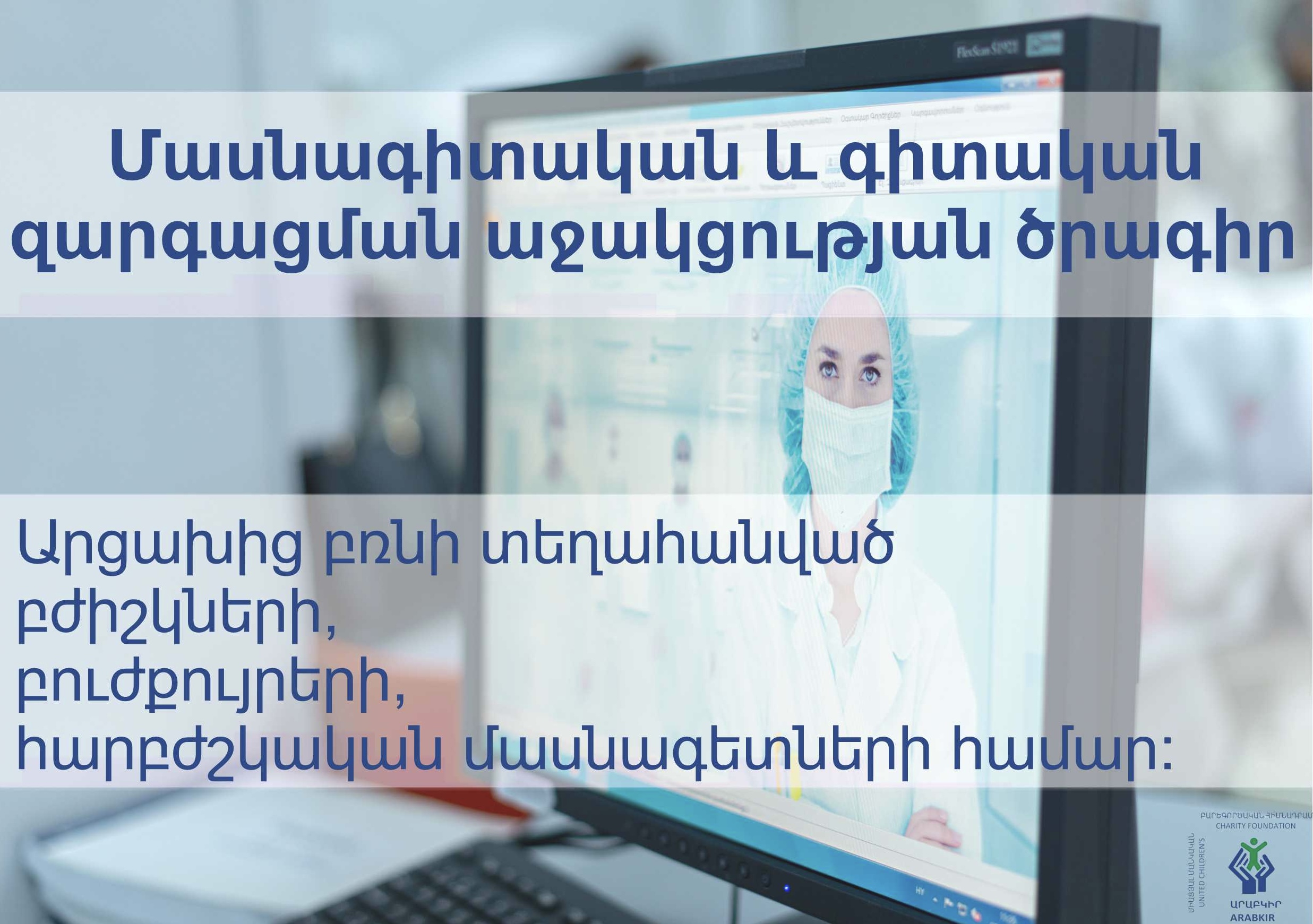
Professional Support Program for Physicians
27 December 23
Attention! Dear colleagues,
“Arabkir” United Children’s Charitable Foundation is pleased to announce the approval of a support program for professional and scientific development of forcibly displaced medical workers from Artsakh for the year 2024, with a total allocation of 2.400.000 AMD. The program is scheduled to commence on 03.01.2024.
Medical workers, including physicians, nurses, lab workers and therapists who have been affected by the siege, war and forced displacement in Artsakh, are invited to apply for the program, without any age restrictions.
The program aims to provide partial financial support, up to 500.000 AMD, for participation in local and international symposia, short-term and long-term courses and training programs. Additionally, financial assistance will be available for publishing articles in internationally recognized, high-impact journals.
The amount of support granted will depend on the rating of the professional program, the extent of participation, and anticipated costs.
Applicants are required to submit confirmation of their participation in conferences or other educational programs, details of expected costs, and, in the case of article publication, evidence of acceptance by the journal along with the associated publication fees.
Decisions regarding applications will be made by the board.
Preference will be given to applicants with theses accepted for presentation at conferences.
Each individual is eligible to apply for the program once a year.
Kindly direct your applications and inquiries to the program coordinator, Biayna Sukhudyan, at [email protected].
Applicants will be informed of the board’s decisions within 10 working days.
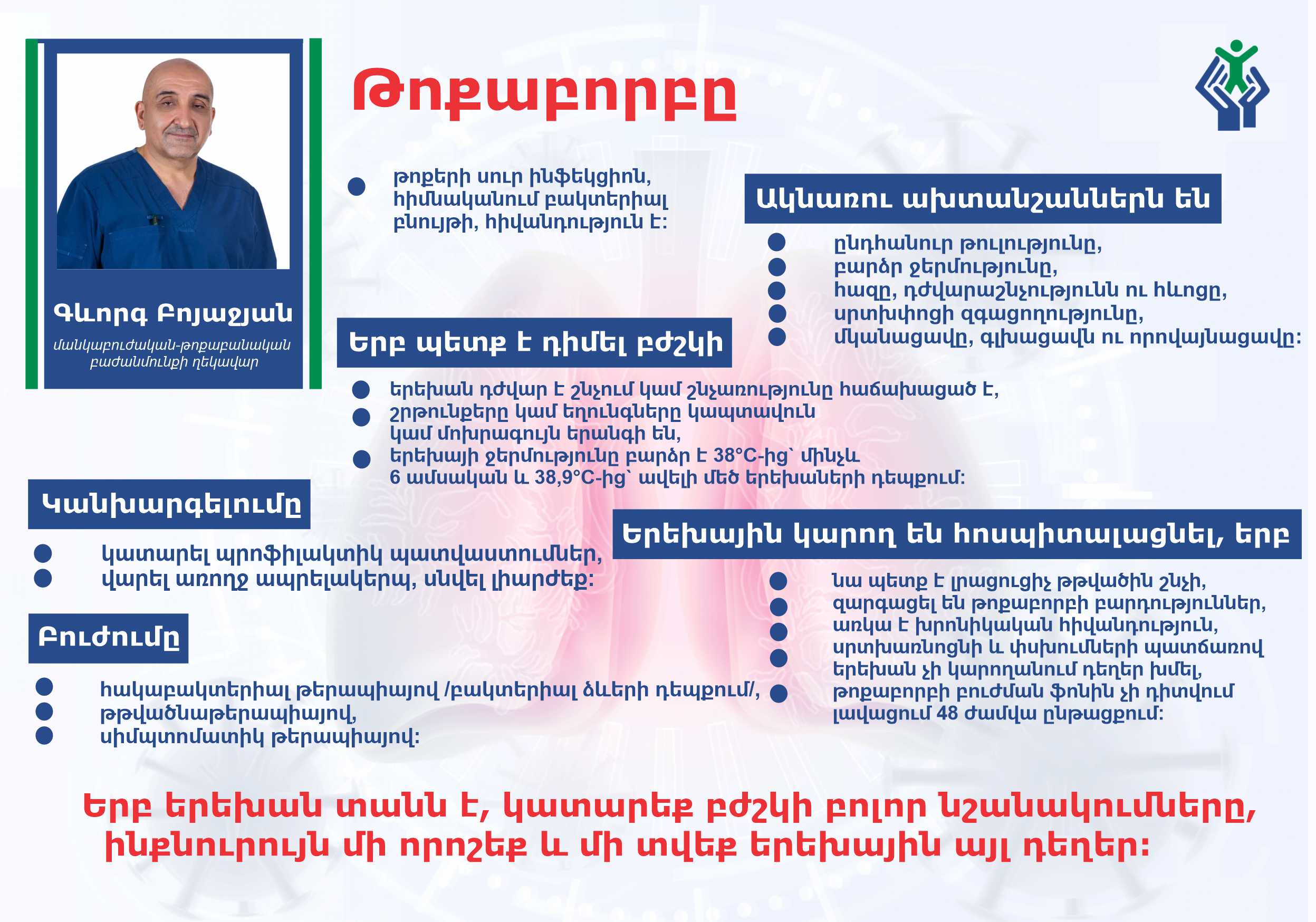
About Pneumonia
25 December 23
Dear parents,
we've noticed many questions about pneumonia lately. The internet has lots of information about this disease, presenting its causes, classification, symptoms and of course, possible complications, ways of treatment and prevention.
In order not to get confused by the abundant and diverse information, we suggest checking out advice from Dr. Boyajyan. He is the head of the Pediatric-Pulmonology department of the “Arabkir” MC. Follow his advice, timely and accurately fulfill the specialist's appointments, without changing the list or quantity of drugs yourself.
Pneumonia is an acute infectious disease of the lungs, mostly caused by bacteria.
Key symptoms:
fatigue and low energy,
fever,
cough and shortness of breath,
palpitations (fluttering in chest),
muscle pain, headaches, abdominal pain.
When to see a doctor:
difficulty or rapid breathing in your child,
bluish or grayish color in lips and fingertips,
persistent fever of 38C or higher (children under 6 months) or 38.9C (older children).
The child might be hospitalized, if:
additional oxygen is required,
pneumonia complications arise,
your child has a chronic disease,
medications can't be taken due to nausea or vomiting,
no improvement within 48 hours of treatment.
Prevention:
vaccinations,
encourage healthy lifestyle and diet.
Treatment:
antibacterial therapy (bacterial pneumonia),
oxygen therapy,
symptomatic therapy.
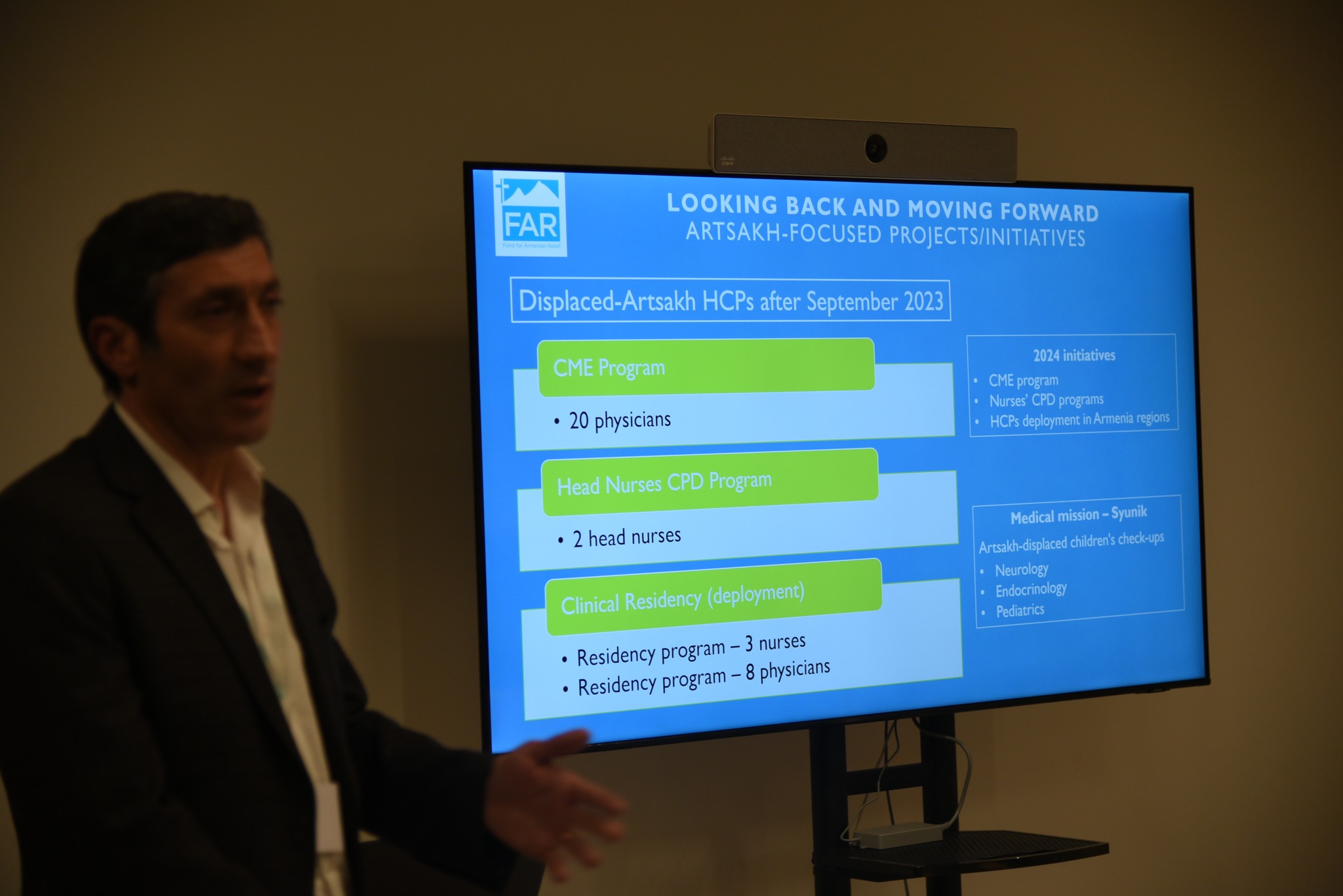
Arabkir MC - FAR
19 December 23
It is an honor for us to have been a partner of the Fund for Armenian Relief (FAR), particularly in supporting the organization’s medical projects for several years. A dedicated team of experienced specialists from the “Arabkir” medical center actively participates in these projects, serving as trainers for continuing professional development courses. Our doctors and nurses have shared and continue to share their professional knowledge and skills, both in Yerevan and in regions, and, until the recent distressing events, in Artsakh through FAR’s projects.
We express our heartfelt gratitude to FAR for their trust and for fostering exemplary partnership relations.
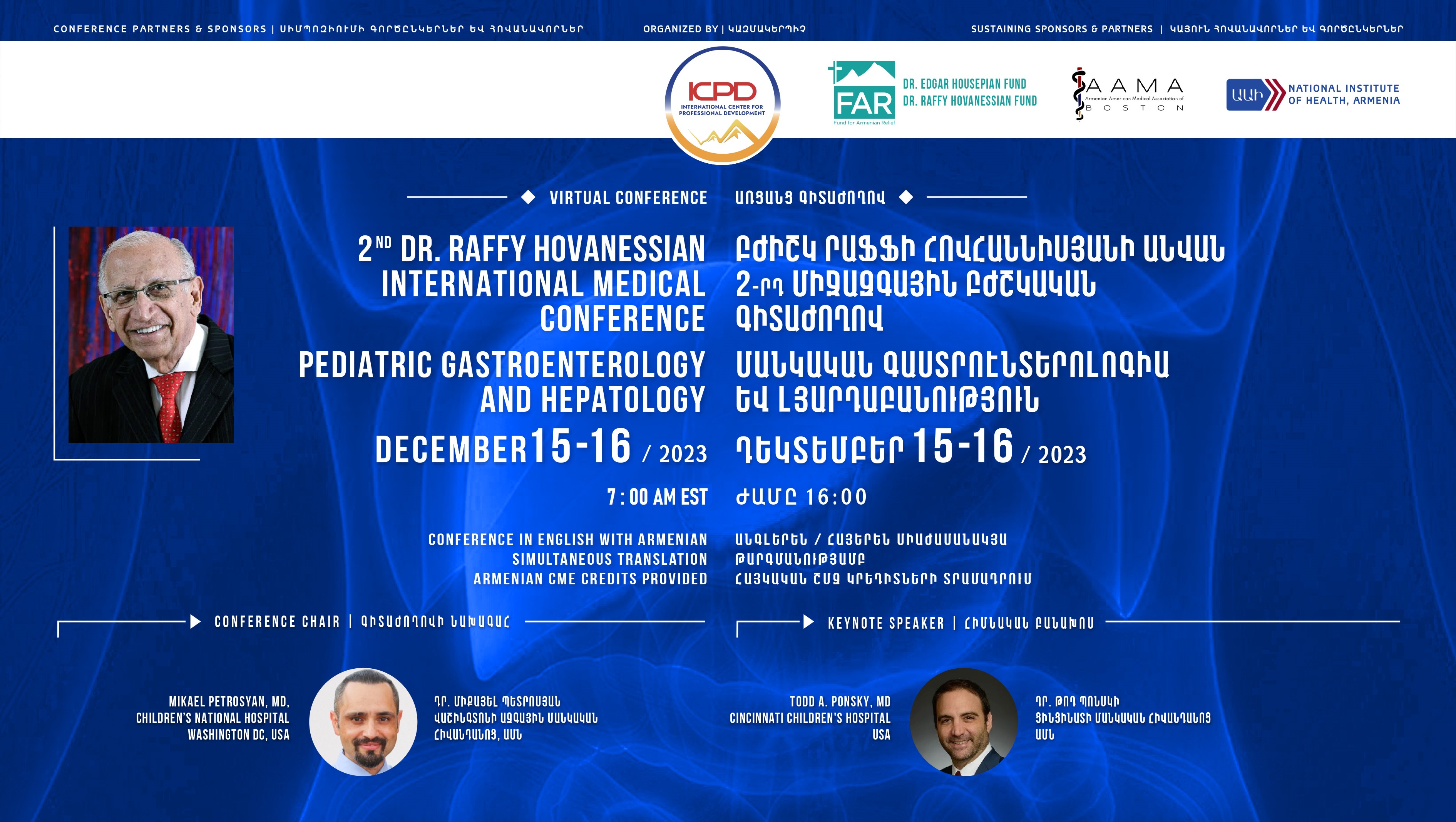
Conference: December 15-16
08 December 23
Attention!
Respected colleagues,
With the efforts of the International Center for Professional Development - ICPD, on December 15 and 16, at 16:00-20:10 Yerevan time, the 2nd Dr. Raffy Hovanessian International Medical Conference on Pediatric Gastroenterology and Hepatology will be held.
The target audience is gastroenterologists, hepatologists, colorectal surgeons, endoscopists, pediatricians, pediatric surgeons, general surgeons, family physicians, infectious diseases specialists, anesthesiologists, digestive and metabolic diseases specialists, nutritionists, emergency specialists, intensivists, oncologists, pathologists, diagnostic imaging specialists, diagnostic laboratory specialists, endocrinologists.
Symposia will be held via Zoom. Participation is free of charge and requires mandatory registration. To register, please follow the link. https://cutt.ly/zwOqOsVC
Please remember, that only one person can register per email and participate. In case of incomplete data filling during registration, the participation will be considered invalid. Upon successful registration, a confirmation email will be sent to the registrant's provided email address immediately.
The official language is English with simultaneous interpretation into Armenian.
Specialists who participate with 90% attendance in the 2-day conference will receive 8 CME credits.
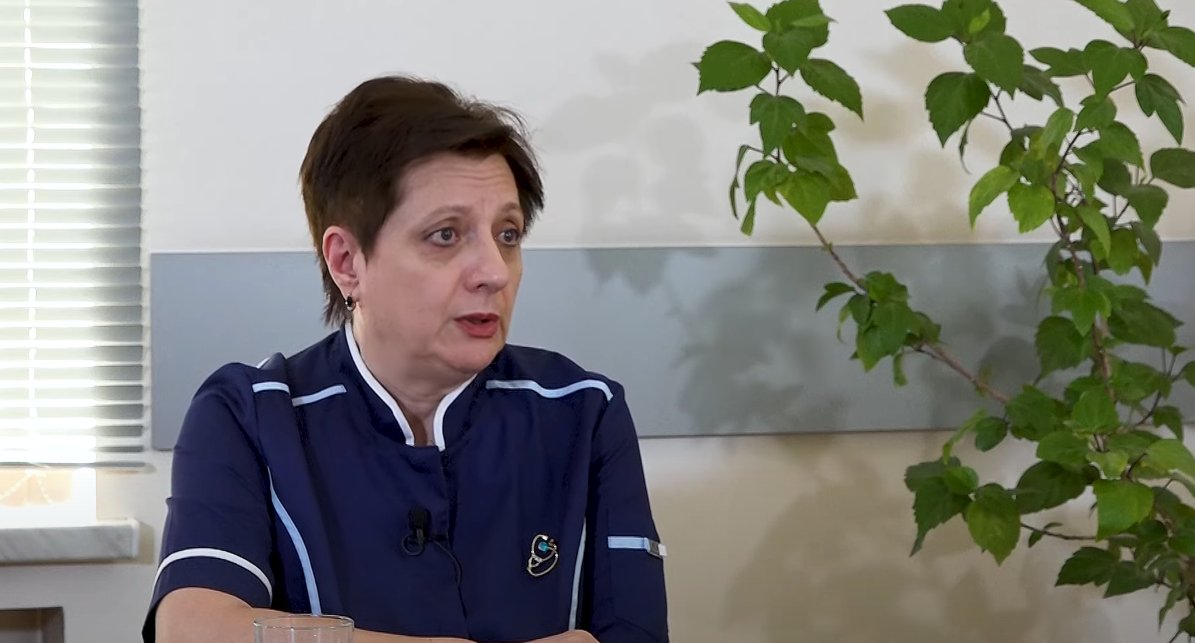
Gayane Amaryan about FMF
01 December 23
Dear parents,
You often ask us about various diseases, their symptoms, how they’re diagnosed, and treatment options and prevention methods. Among the topics that come up frequently is Familial Mediterranean Fever, which is very common among us.
Professor Gayane Amaryan has stepped up to answer the questions on the “Novosti Armenia” website. Get the lowdown on this condition and find the answers to your questions.
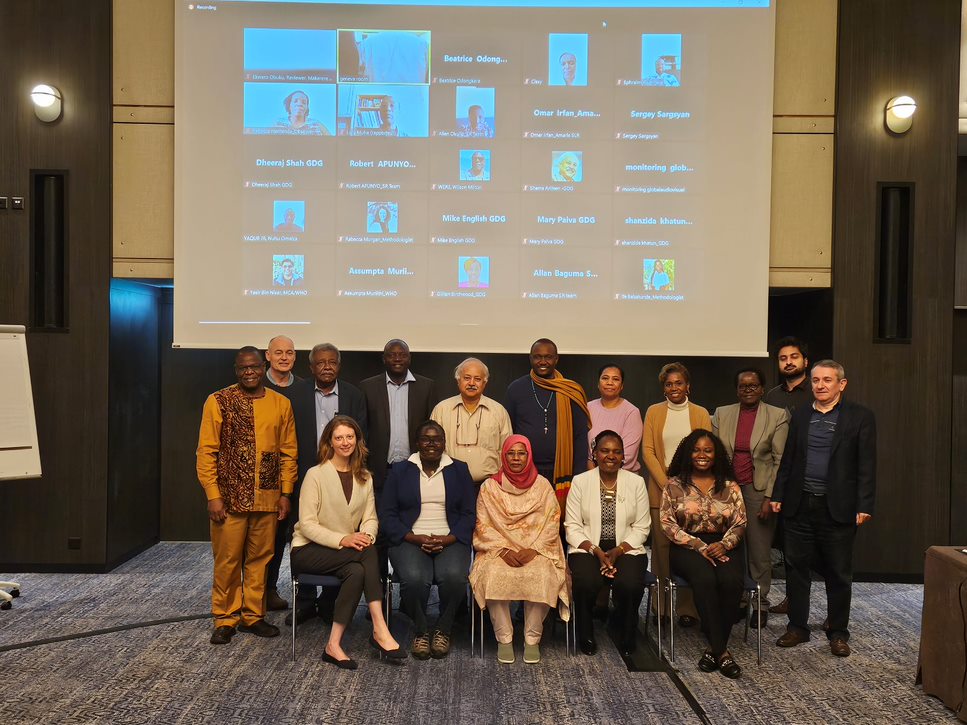
Sergey Sargsyan is WHO expert
24 November 23
The Geneva Central Office of the World Health Organization has initiated a process of updating hospital pediatric guidelines, in which selected experts from all regions of the world participate: from the USA, Great Britain, India, Qatar, African, Asian, South American countries.
Sergey Sargsyan, an expert representing the Eastern European region of the WHO and serving as the head of the Institute of Children and Adolescent Health at "Arabkir" MC, along with his role as a consultant on pediatrics for the Ministry of Health, is actively contributing to this initiative. He served as a co-editor in developing the WHO European guideline for outpatient treatment, published in 2022.
Collaborating with the WHO, the Ministry of Health of the RA is translating the handbook for localized implementation in Armenia.
These combined efforts play a crucial role in developing tailored guidelines for Armenia and significantly enhancing the quality of healthcare for both children and adults.
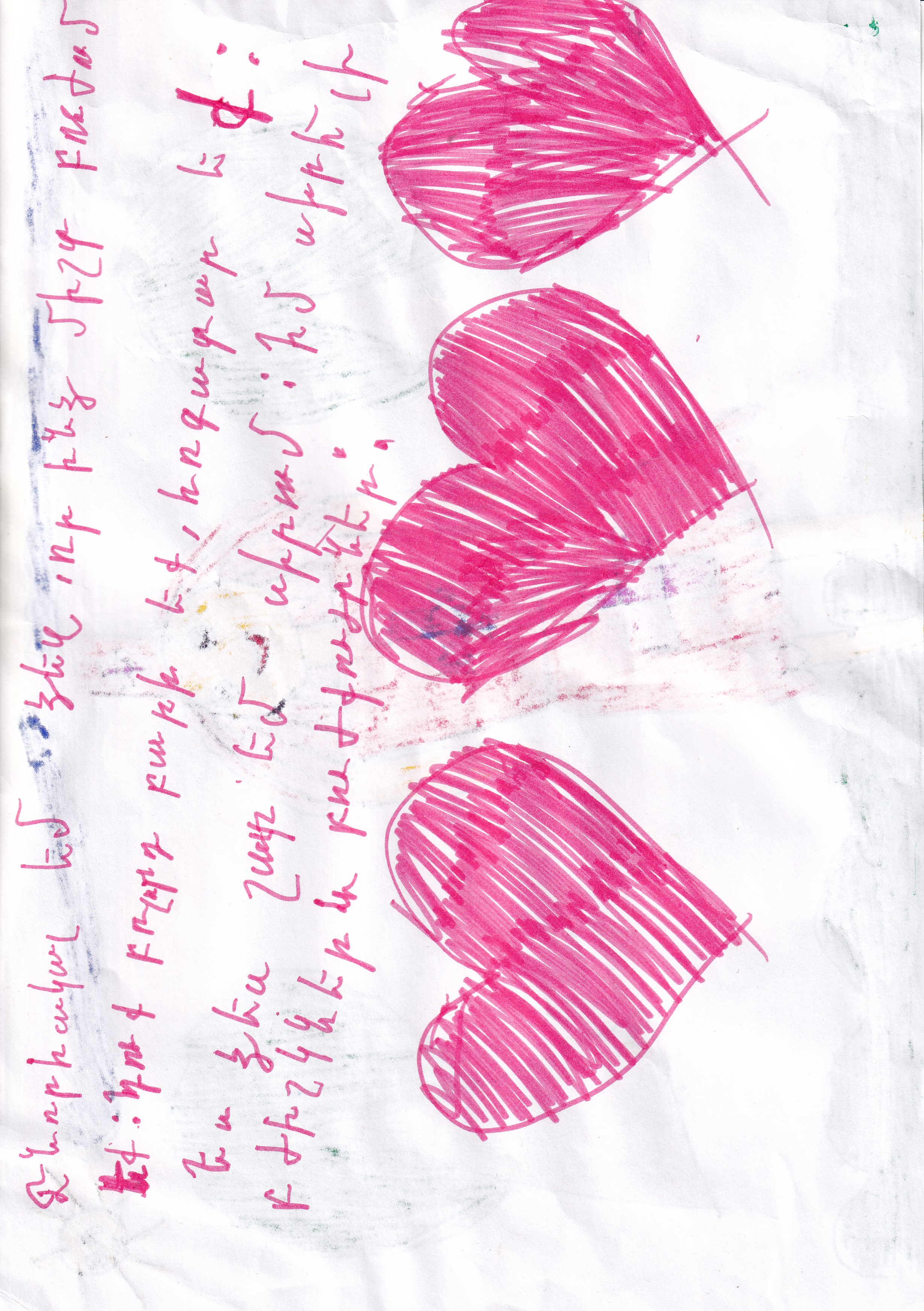
Pediatrician Day
20 November 23
Dear Pediatricians,
Happy Pediatrician's Day! Your dedication and care for our children are invaluable. The heartfelt drawings adorning the walls of your rooms stand as a testament to the unwavering love and trust your little patients have for you—a trust that serves as the best medicine.
May your health be robust as you continue to heal and nurture our children. Embrace the pure love they radiate, finding joy in every moment of care.
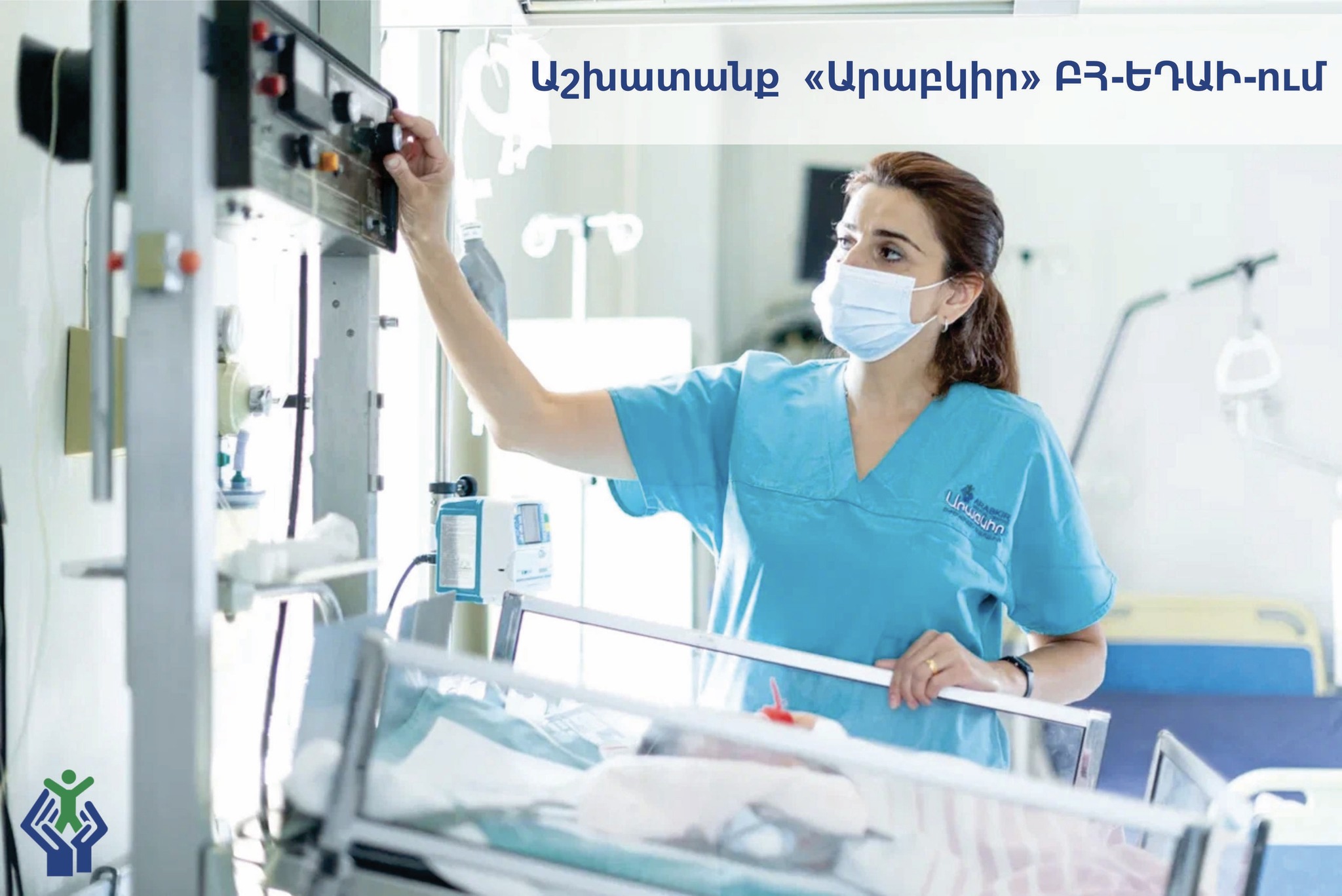
We are hiring nurses
20 November 23
“Arabkir” Medical Center is hiring nurses on a permanent basis, for shift and day work schedules.
Responsibilities:
perform the appointments of doctors accurately and fully, with quality and on time,
perform the organization of laboratory and instrumental examinations on time, monitor the results,
perform therapeutic care of patients, diagnostic, treatment and prevention interventions according to the doctor’s appointment.
Requirements:
secondary vocational education,
kind, friendly and willing to learn.
To apply, send your CV and motivational letter to [email protected].
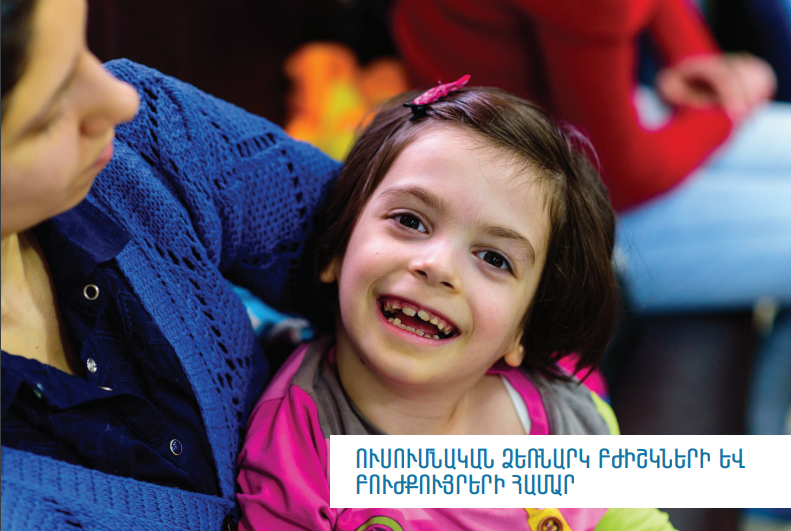
New Guidebook
08 November 23
Dear colleagues,
We are delighted to present the “Children’s development and developmental delays. Principles of early identification” guidebook. This publication is a collaborative effort between the “Arabkir” United Children’s Charitable Foundation and UNICEF Armenia. It is intended for doctors and nurses.
The publication program for this guidebook has been successfully executed with support from the Russian Federation. The training module was approved and endorsed by the Ministry of Health of Armenia.
The guidebook covers children’s developmental milestones, developmental disorders, detailed information on developmental assessments, early intervention strategies, and guidance for engaging with parents and caregivers.
The guidebook is available on the UNICEF Armenia page and “Arabkir” MC-ICAH website.
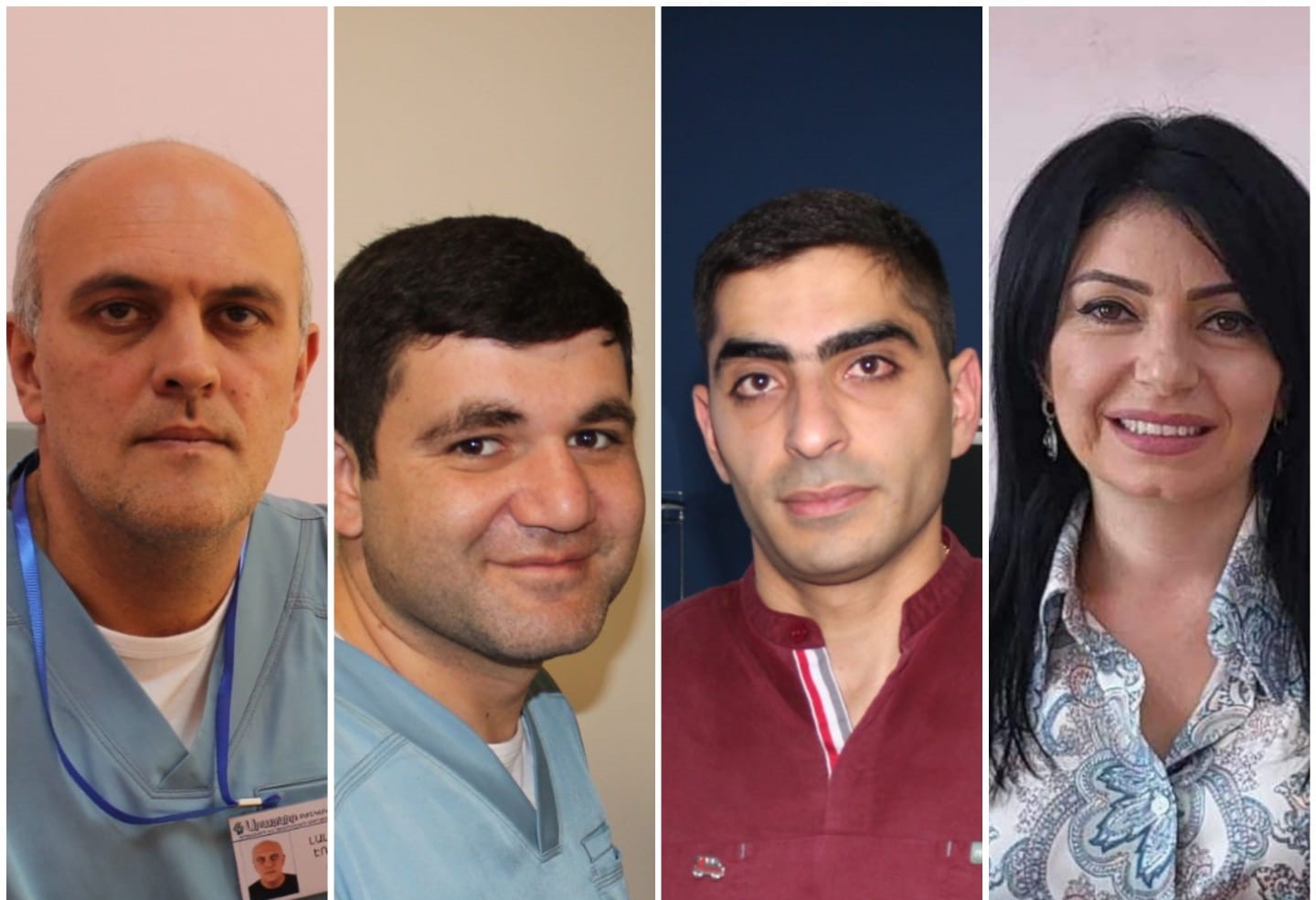
Our New Colleagues
01 November 23
Dear compatriots,
We are delighted to announce that our professional team at the "Arabkir" medical center has expanded with the addition of the following colleagues:
Ernest Lalayan, Pediatrician,
Ruben Khachatryan, Radiologist
Armen Abrahamyan, Gastroenterologist and Endoscopist
Liana Grigoryan, Speech Therapist
If you require our services, please feel free to register in advance:
for pediatric consultations, please call 015 400 300 and select extension 21 27,
to schedule ultrasonography appointment, please call 010 23 20 20,
for GI consultations and endoscopic examinations, please call 015 400 300 and select extension 12 16,
for speech therapy sessions, please call 010 26 47 62.
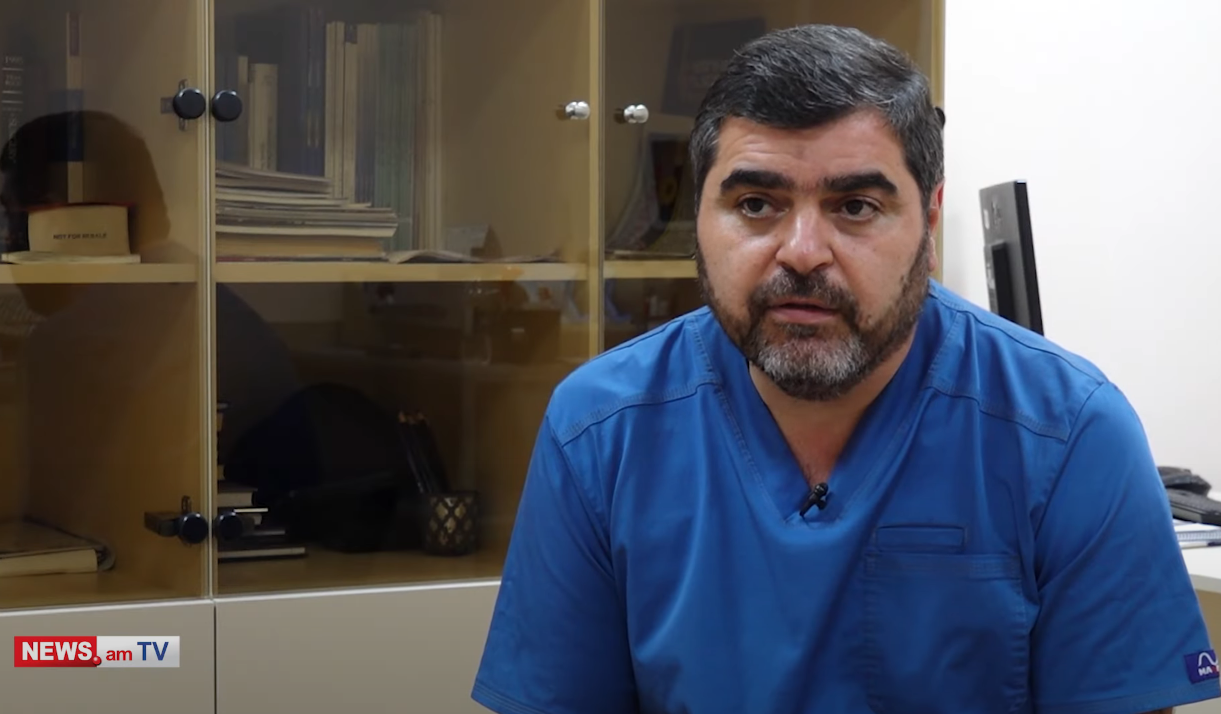
Pediatric Orthopedics: clubfoot and dysplasia
18 October 23
This video from news.am discusses congenital clubfoot and hip joint dysplasia, the most common pathologies in pediatric orthopedics.
Vahe Yavryan, the head of the Orthopedics and Traumatology department of the “Arabkir” medical center, presents details about these conditions.
The two most common conditions in pediatric orthopedics are congenital clubfoot and hip joint dysplasia. According to statistics, the incidence of clubfoot is 1.5 in 1000 newborns. About 40 children are born with hip joint dysplasia, where the joint does not develop properly, and 2 are born with complete joint dislocation. In recent years, significant advancements have been made in the approaches to addressing these two problems, which help prevent disabilities in children.
Vahe Yavryan, the head of the Orthopedics and Traumatology department of the “Arabkir” medical center, explains that in the case of clubfoot, children used to undergo several surgeries, and 15 percent of them were disabled for the rest of their lives. However, everything changed in the 2000s when the Ponseti method was introduced. This method was brought to Armenia by Vahe Yavryan himself in 2012 after studying at Iowa University at the workplace of its author, Ignacio Ponseti, and then returning to the “Arabkir” medical center.
“The Ponseti method is a special casting technique that must be performed exactly as described. Its effectiveness has been proven through the treatment of millions of children with clubfoot. Following this, the second stage involves a subcutaneous tenotomy of the achilles tendon. This stage is necessary for 95 percent of children with clubfoot. Subsequently, the third stage requires children to wear braces. In Armenia, “Iowa” braces are used. While there are other types of braces available, the “Iowa” brace was designed by the University of Iowa. These three components of treatment are equally vital. In other words, it cannot be stated that minor surgery, casting or the brace is more important: the combination of these elements produces the result we have today,” says doctor Yavryan.
Thanks to this method, no child in Armenia has undergone complex surgery since 2012, and no child has suffered from disability due to clubfoot.
“Now we consider the sole, which not only rests on its entire surface but also retains its functionality and the range of movements in joints, as a significant treatment outcome. I always tell parents that if we adhere to the protocol, and if you want your child to play football, they can play football with that sole” he says.
Vahe Yavryan also points out that parents themselves can easily diagnose clubfoot: the sole cannot be straightened by hand.
“Congenital clubfoot is a 4-component deformity that cannot be corrected with simple hand movement. The problem lies in the connective tissue and, most of the time, in the shortness of ligaments, leading to the dislocation and subluxation of the bones that make up the sole. It is impossible to confuse this with positional problems, which may be present in the prenatal stage and can be easily corrected by hand. I typically tell my students that there’s no need for a doctor to diagnose clubfoot because it’s such a visible deformity that parents can notice after childbirth. If the deformity is fully corrected by hand, it means it’s not a congenital clubfoot” says the pediatric traumatologist.
The doctor presents a complex clinical case: recently, a 5-year-old child was admitted to the hospital who had not received any treatment for clubfoot.
“It was unusual for us that the child had not received any treatment before. Previously, it would have been difficult to imagine that a 5-year-old clubfoot could be treated with casting. However, as we are familiar with the literature and know that the Ponseti method is used not only for newborns, and there are articles about 10 year olds, so we decided to treat the child using this method. The child received 7 casts, after which we performed a subcutaneous tenotomy of the Achilles tendon and now the child is wearing orthosis. The results were satisfying. We have a sole that rests on the entire surface and is quite functional for a 5-year-old untreated case” he says.
And what are dysplasia and dislocation of the hip joint? The doctor mentions that there is a misunderstanding about the dislocation of the hip joint, as it is a result of birth. In reality, it is a congenital problem: dysplasia or underdevelopment of the joint, and the last stage being the dislocation.
“This has been a significant issue for orthopedics because the clinical examination and symptoms that we knew and still know, allowed us to diagnose the children who were born with joint dislocation and therefore, severely limited diagnosis those children who were born with dysplasia. In addition to clinical examination we had an alternative - X-ray, which did not allow us to make a diagnosis. From the 1960s-70s, sonographic examination of hip joints in newborns began to be applied and was eventually introduced by Austrian Professor Graf. Later it was accepted by the medical community as a proven diagnostic method and is now considered the gold standard of diagnosis” the specialist says.
Vahe Yavryan studied under Graf in Austria and then tested the method for a year in one of the maternity hospitals in Yerevan. After long-term collaboration with the Ministry of Health, ultrasound screening for hip joint issues was introduced in Armenia as part of the nationwide newborn screening program. Doctor Yavryan takes pride in noting that not all European countries have such screening programs. Thanks to the program, today in Armenia, children with disabilities caused by this problem are a rare occurrence.
“The method has very high accuracy, approximately 99.9 percent. It allows us to detect even the smallest underdeveloped hip joint and take appropriate measures so that the child receives treatment in a timely manner. In 2007, according to official data, every year in the Republic of Armenia, we had 20 children who became 1st degree disabled due to dislocation or developmental dislocation of the hip joint. This is why the disability rate in our country was the highest. When I was just starting, my teacher performed open surgeries on nearly 30 children. To understand the changes that the screening has brought to our country, I can say that last year, there were only 4 cases due to hip joint dislocation. There is a golden rule, according to which we have early and late diagnosis. Early diagnosis is made within the first 3 months of the problem. When we initiate the treatment at that time, we can determine if it’s dysplastic or dislocated, and the probability of achieving an anatomically good, functional joint is 98 percent throughout one’s entire life,” says Yavryan.
At the “Arabkir” medical center, parents are provided with a special information sheet that provides detailed guidance on caring for a child with hip joint dysplasia to prevent joint dislocation.
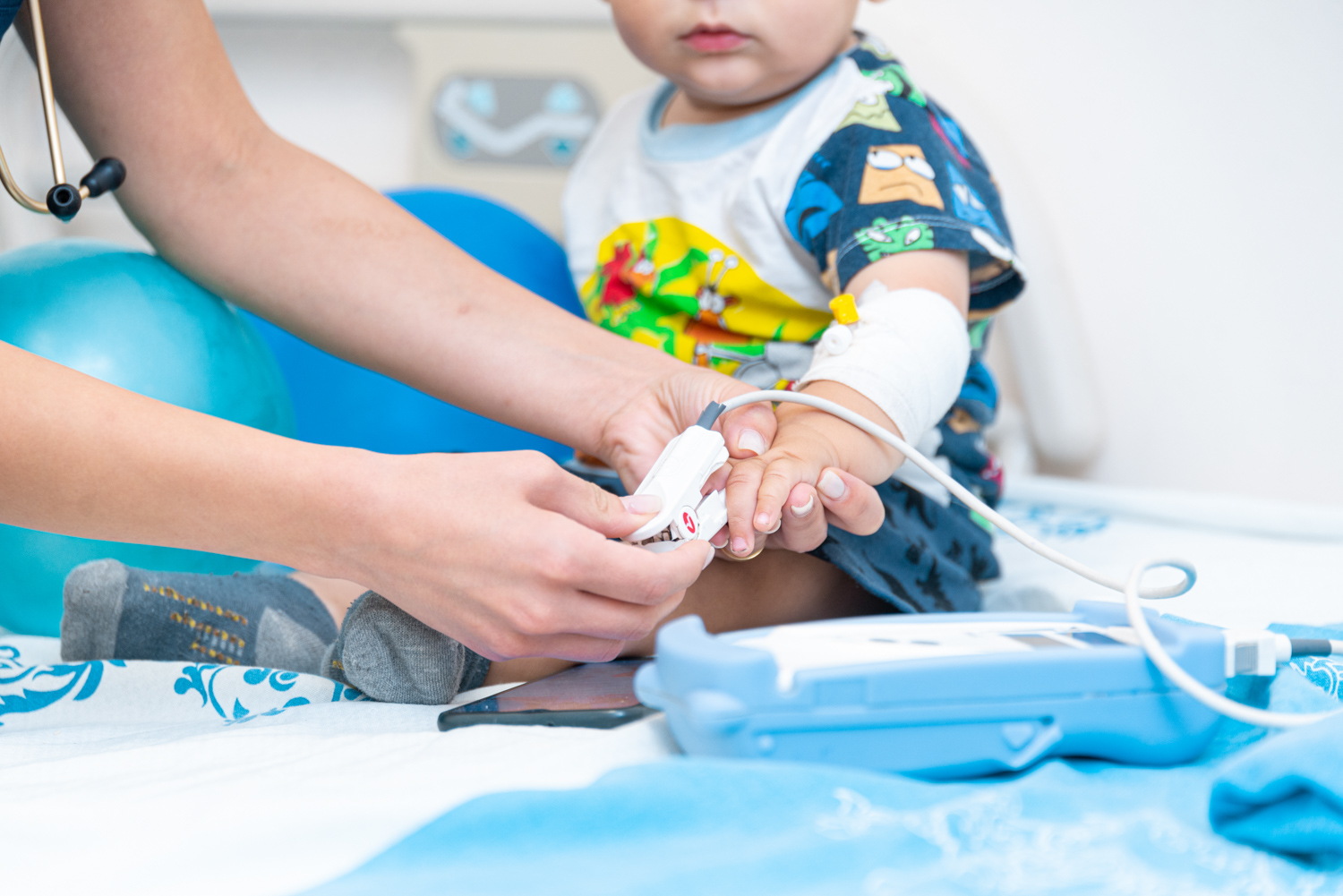
Pediatric Conference, October 20-21
16 October 23
Dear colleagues,
We kindly inform you that on October 20-21, from 13:00 to 19:00, the joint pediatric conference of the Armenian Pediatric Association, the “Armenian Eyecare Project” Charitable Organization, and Children’s Hospital Los Angeles will take place at the DoubleTree by Hilton hotel Conference hall. The conference will be held in a hybrid format.
For further details, please visit: https://learnwithopen.org/.../aecp-chla-21th.../
Advance registration is required. Registration link: https://us02web.zoom.us/.../WN_hRE5hbERQ5225YMb50asTg...
Participants will receive CME credits from the Ministry of Health of the RA.
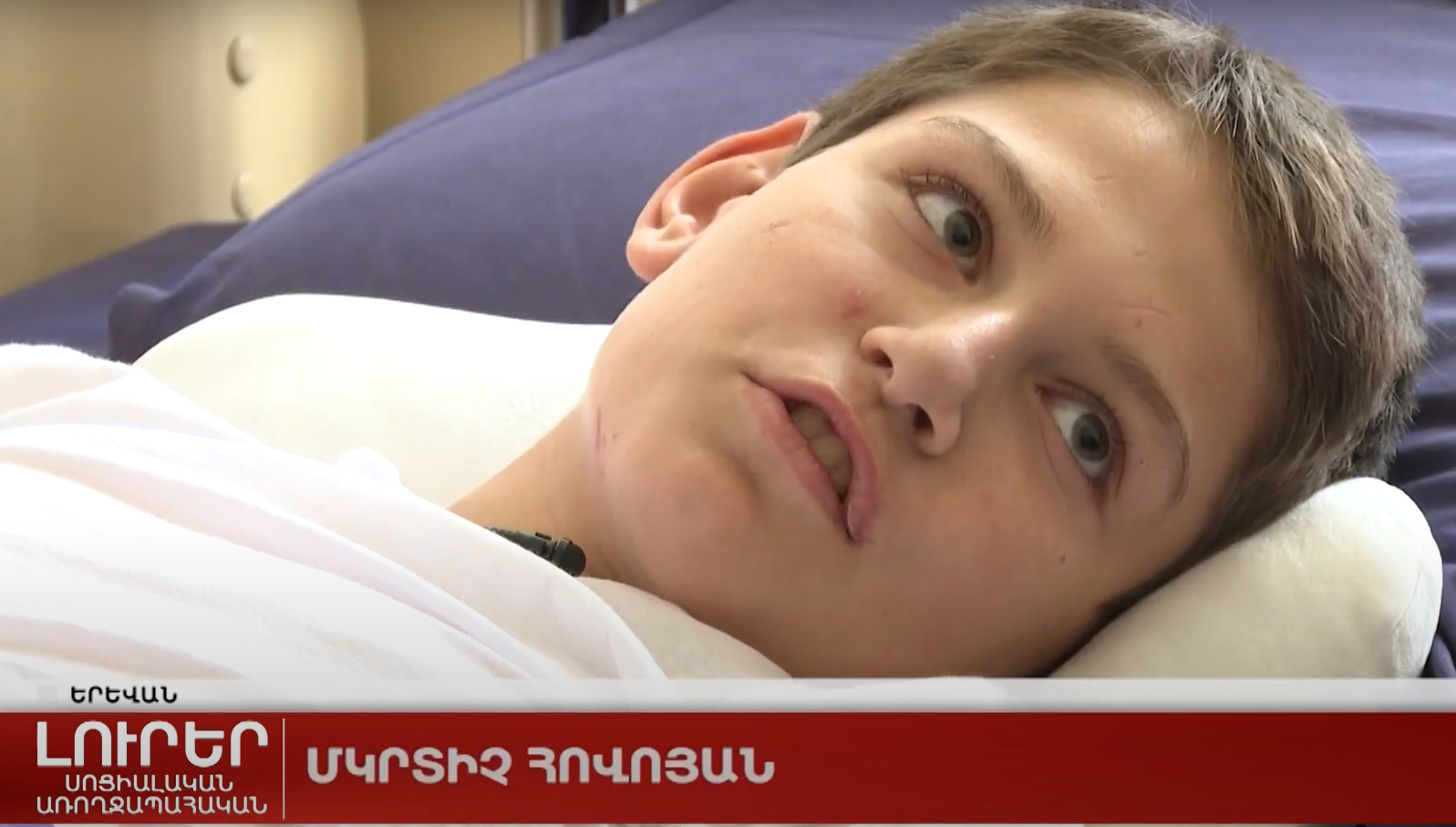
Mkrtich, the boy with shrapnel wounds from Artsakh
09 October 23
The Public TV report on brave Mkrtich.
The boy suffered shrapnel wounds in Vank village, Martakert.
For the past few days, Vazgen has been caressing his son with extreme care, almost not touching. He dreads causing any more pain to his son. There are hundreds of pieces of shrapnel in his 13-year-old son’s body. He shares a recent photo taken in the hospital, relieved that his son is looking better now.
Vazgen Hovoyan: “My wife sent me to take pictures of our children. When I returned, she was out of the operating room.”
His wife is also dealing with shrapnel wounds, and she is undergoing treatment in a different hospital.
They used to live in Vank village in Martakert after the 2020 war, having moved from Dadivank.
Mkrtich Hovoyan: “We were at home, just sitting, when…”
An explosion occurred. AnAzerbaijani missile, originally aimed at civilian objects, landed directly on their house.
Mkrtich Hovoyan: “First, there was a yellow light, then an explosion. Everything turned black afterwards. And…I woke up, but I can't remember whether I fell or not…My chest hurt, and I got back on my feet.”
They transported him to the hospital and performed two surgeries.
Albert Lalazaryan, Pediatric Surgeon: “He had a multifragmentary fracture of the left mandibular ramus, fortunately without displacement. He also had a first left rib fracture, again without displacement. In addition, he has a foreign body (fragments from the bomb) in the lower lobe of the left lung, with a lower lobe contusion of the left lung and hemothorax. There was also a foreign body in his spleen.”
His stomach was wounded in three parts, his small bowels in 15 places, and the large bowel in one.
Albert Lalazaryan, Pediatric Surgeon: “He underwent a surgery, during which a colostomy was created on the left side.”
Mkrtich Hovoyan: “At first, these two wounds caused intense pain, and I couldn’t move my hand like this. But over time, these wounds healed.”
There was a foreign body in his right wrist area.
Mkrtich Hovoyan: “I could not feel my finger up to this part, and my thumb hurt as well. Surgeons operated on it, and now I can move all my fingers, except the thumb, which still hurts.”
Even today, he carries numerous shrapnel fragments in his soft tissue, from head to toe.
Albert Lalazaryan: “The most significant risk we face today is the fragment lodged in his lower lobe of the lung, which can damage the lung tissue during breathing movements and could, at some point, come into proximity with major blood vessels, potentially causing severe bleeding.”
Currently, they are awaiting removal of the fragment, which may also necessitate the removal of a part of his lung. Another concern is the foreign body in his spleen.
Albert Lalazaryan: “The fragment in the spleen is currently stable, and the risk of bleeding is relatively low, but there is a potential risk of infection. If an infection were to occur in the spleen, it would present a problem and we might need to consider spleen removal.”
Specialists assure that the effects of shrapnel wounds will become noticeable in the months ahead. However, Mkrtich remains positive and resolute:
Mkrtich Hovoyan: “Everything is going well.”
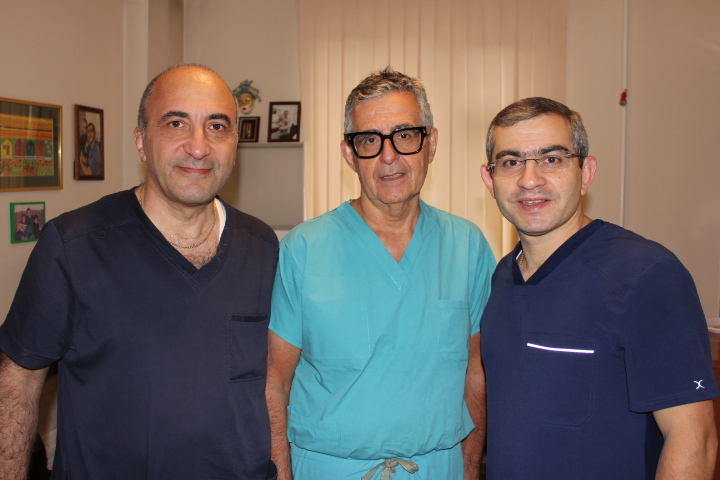
Surgeries with US colleagues
09 October 23
Colleagues from the US, including Professor Paul Merguerian, a pediatric urologist from Seattle Children's Hospital, and pediatric surgeon Caitlin Smith, visited the “Arabkir” medical center during their regular two-week visit.
Working alongside our team of uro-surgical specialists, the experts from the US conducted over 40 consultations and performed operations aimed at treating rare developmental defects. These conditions included epispadias, disorders of sex development, adrenogenital syndrome, complex cases of hypospadias, as well as anomalies of the anus, rectum, developmental defects of the colon (Hirschsprung's disease), and acute purulent inflammatory diseases in the form of perirectal fistulas.
The operations were successful, and the patients are currently in the post-operative phase. We also provided separate consultation hours, not only for new patients but also for those who had previously undergone such procedures and are under continuous doctor supervision.
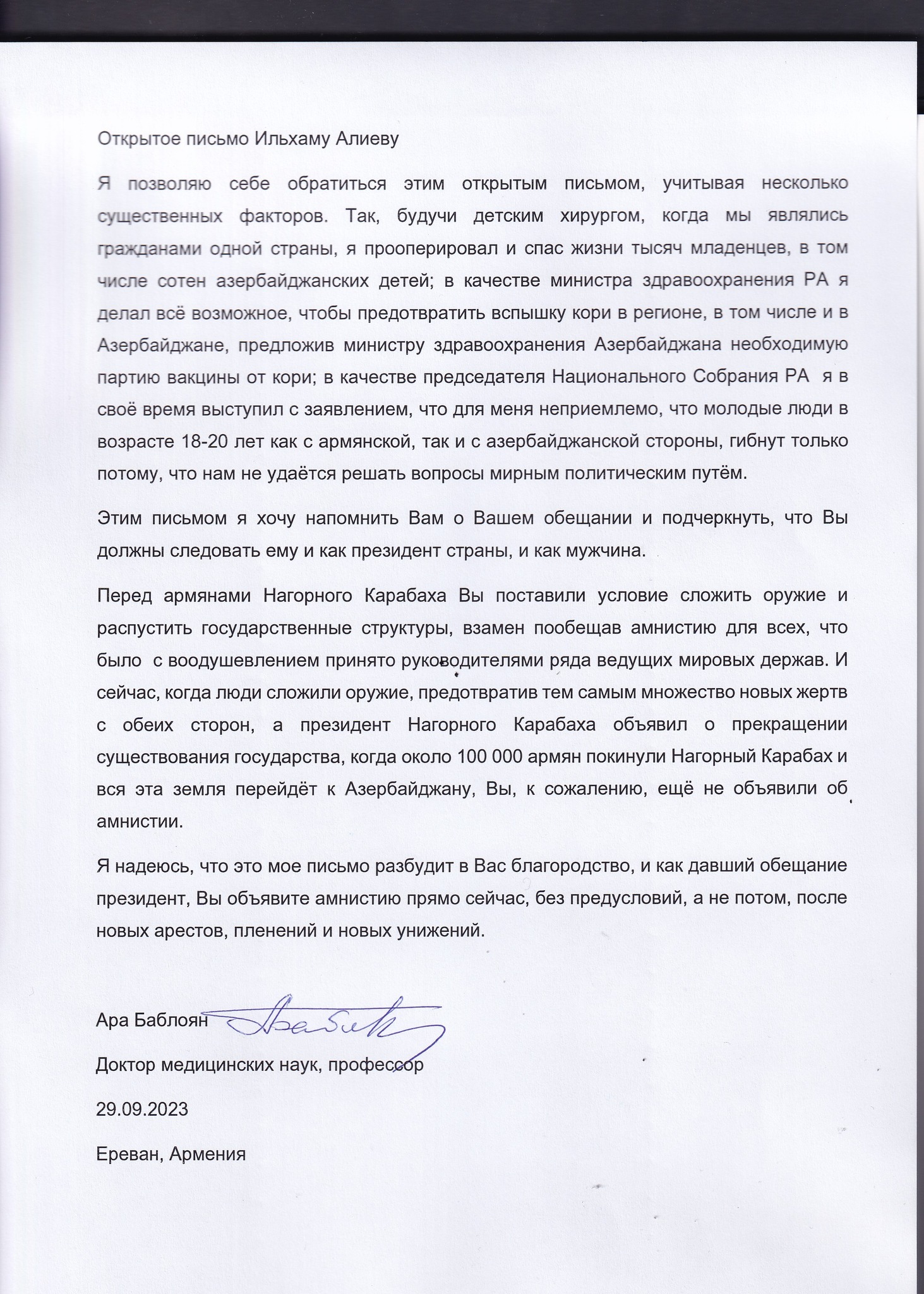
Ara Babloyan’s open letter to Ilham Aliyev
29 September 23
Open Letter to Ilham Aliyev
I allow myself to address this open letter considering many circumstances: I, as a pediatric surgeon, have operated on and saved the lives of thousands of children, among them hundreds of Azerbaijani children, when we were all citizens of the same country. As the Minister of Health of the RA, I did everything possible to prevent the outbreak of measles in our region, including Azerbaijan, offering the necessary batch of the measles vaccine to the Azerbaijani Minister of Health. As the President of the National Assembly of the RA, I made a statement that it is unacceptable to me that young people aged 18-20, both from the Armenian and Azerbaijani sides, are dying simply because we cannot resolve issues through peaceful political means.
With this letter, I want to remind you of your promise and emphasize that you should adhere to it both as the president of the country and as a man.
You set a condition before the Armenians of the Nagorno Karabakh, to lay down their weapons and dissolve state structures, promising amnesty for all in return. This was enthusiastically welcomed by the leaders of a number of leading countries in the world. And now, when people have laid down their weapons, thereby preventing many new casualties on both sides, and the president of Nagorno Karabakh has announced the cessation of the existence of the state, with almost 100.000 Armenians leaving Nagorno Karabakh and all that land will pass to Azerbaijan, you, unfortunately, have not yet declared amnesty.
I hope that my letter will awaken dignity in you, and as a president who made a promise, you will declare amnesty right now, without any preconditions, rather than later, after new arrests, detentions and humiliations.
Ara Babloyan,
Doctor of Medical Sciences, Professor
29.09.2023
Yerevan, Armenia
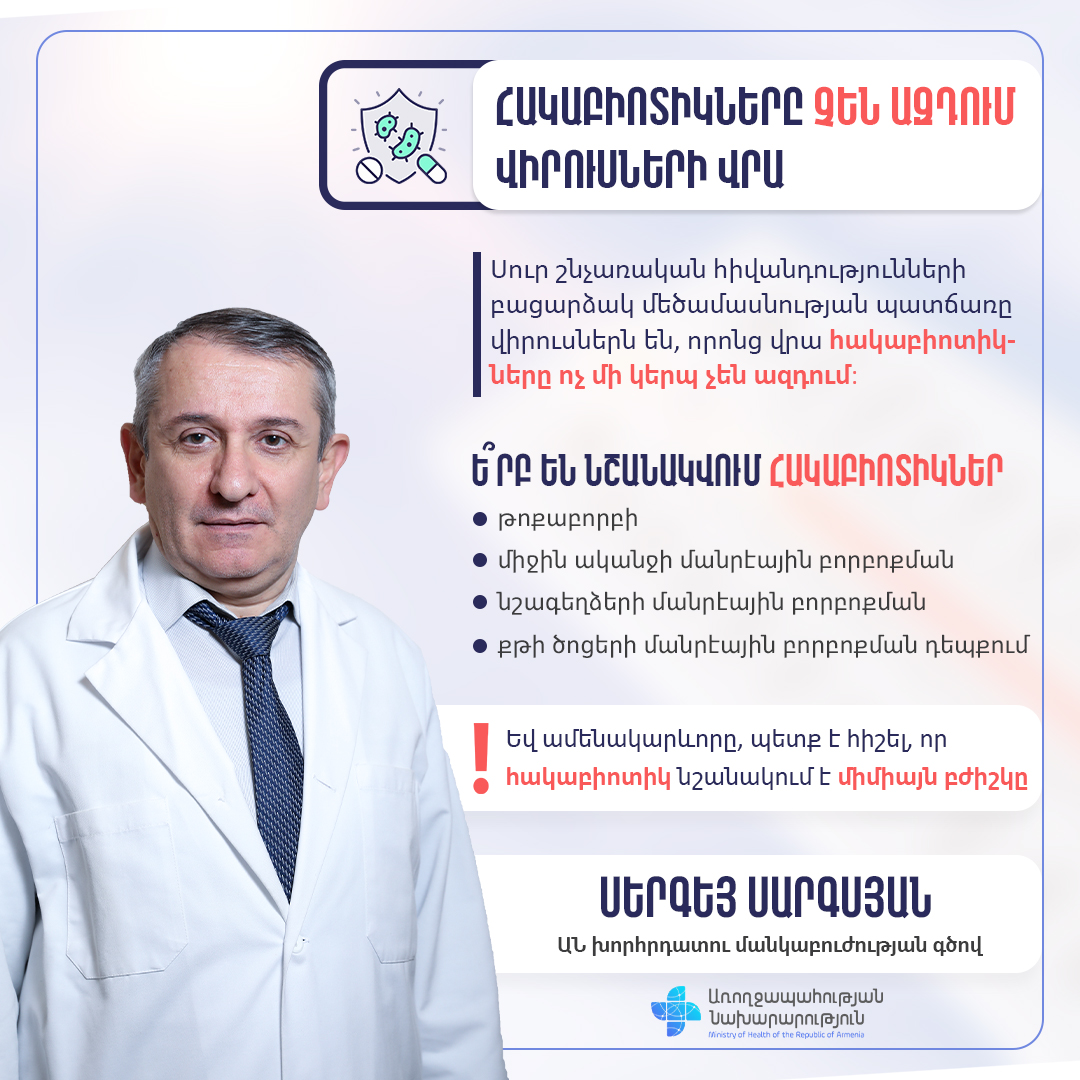
Doctor’s Advice
19 September 23
Sergey Sargsyan, the head of the Institute of Child and Adolescent Health and a consultant in Pediatrics at the Ministry of Health has presented brief and precise information about antibiotics.
Antibiotics do not affect viruses. The vast majority of acute respiratory diseases are caused by viruses, to which antibiotics have no effect.
Antibiotics are prescribed in cases of pneumonia, otitis media, tonsillitis and sinusitis.
The use of antibiotics without appropriate instructions can lead to allergic reactions, as well as cause specific bacterial inflammation of bowels. Antibiotics affect negatively on beneficial bacteria living in the human body.
But this does not mean that antibiotics lose their important, sometimes life-saving role. These medications are used to treat many diseases. However, there should be clear indications for prescribing, and the type, dosage and duration of the drug should correspond with the approaches of modern medicine. Otherwise, resistance to the antibiotic may develop, and it will no longer be effective in the patient’s treatment.
Read and avoid misuse and overuse of antibiotics. And most importantly, remember that antibiotics are prescribed only by a doctor.
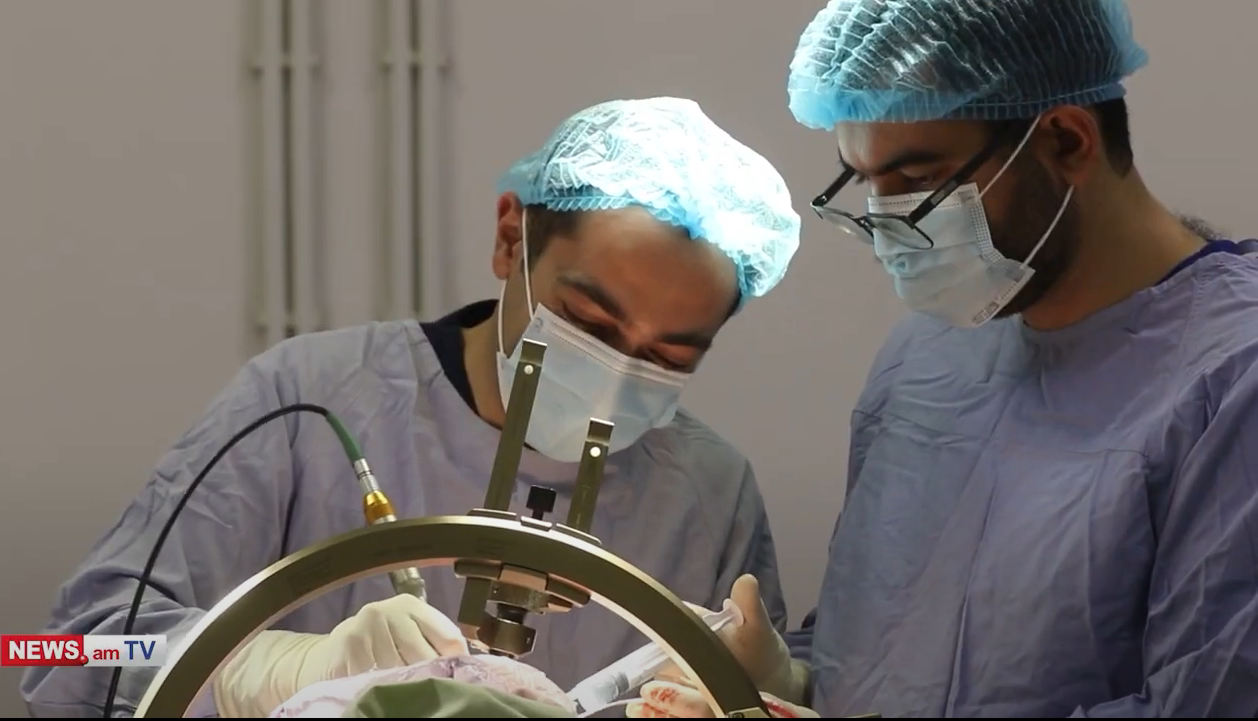
Brain Cyst Drainage
07 September 23
Another neurosurgical operation using the stereotactic system was performed in the "Arabkir" medical center. This system allows interventions that were previously considered impossible.
The video produced by News.am showcases the drainage of a brain cyst in a 35-year-old patient using a stereotactic system. It is also used in the surgical treatment of Parkinson's disease, epilepsy, as well as during brain tumor ablation, radiosurgery and biopsy.
Neurosurgeon Sevak Badalyan and the head of the neurosurgical service, Niko Arzumanyan, provide detailed insights into the procedure.
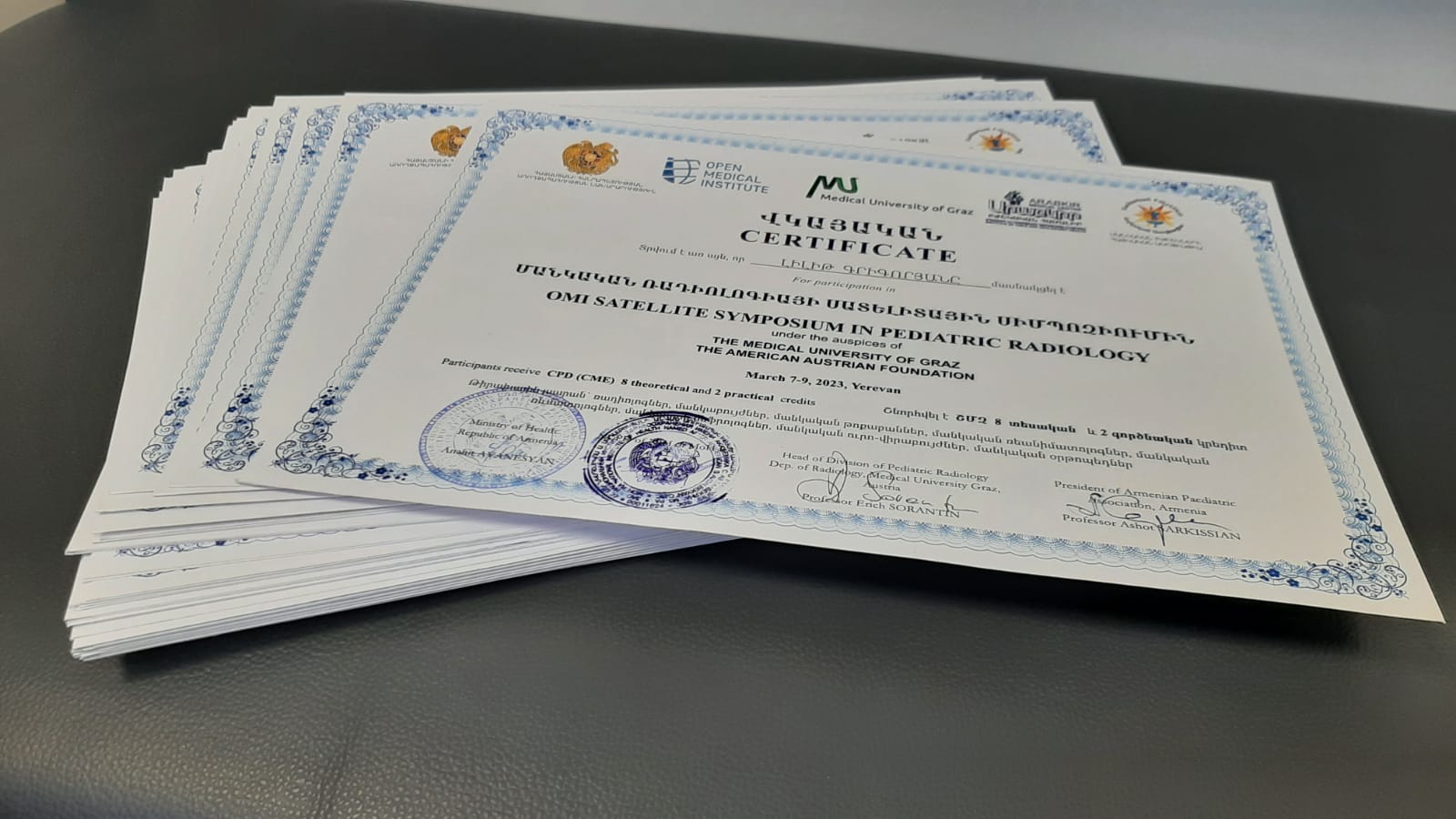
Pediatric Radiology: Symposium Certificates
06 September 23
Attention! Dear colleagues,
if you have not yet received the certificates of the accredited symposium devoted to Pediatric Radiology held by Professor Erik Sorantin of the University of Graz, Austria, please call the Diagnostic Radiology service of the "Arabkir" medical complex (phone number - 010 23 30 30) and introduce yourself, mentioning your participation in the symposium. Our employees will verify the availability of the certificate and invite you to receive it.
We would like to remind you that the symposium was organized by Diagnostic Radiation service of "Arabkir" MC-ICAH, Arabkir Young Physicians Association - AYPA and Armenian Association of Pediatric Doctors within the framework of Open Medical Institute's satellite symposia program.
The Ministry of Health credited the symposium with 2 practical and 8 theoretical units.

Happy September, dear students!
01 September 23
We wish you all a healthy, peaceful and courageous journey on the challenging path of education. Learn how to learn and love the process of learning. Remember, a student without a passion for learning is like a bird without wings. Keep your wings tight so that your flight is higher and freer. Strive towards the light: it is there, despite the dark moments.

Artsakh Children in the camp of “Arabkir”
03 August 23
The “Aparan” resort camp continues to provide days filled with educational, sports, resting and rehabilitation programs. This year, around ten children of the campers are from Artsakh, including Stepanakert and other cities and villages. They, like others, are registered at various dispensaries of the “Arabkir” medical center and visit for regular checkups, examinations, and to receive medications. These children from Artsakh were in Armenia, when the only road back home was closed. Their participation in the camp was made possible through the support of the “Arabkir” United Children’s Charity Foundation.
Andranik, Aren and Arman are brothers from Aygestan village in Askeran. Aren likes football hours in the camp, while Andranik likes interacting with other children. Here they found new friends, new connections and are hopeful there will be more opportunities to meet and spend time together.
And for Marcel, the camp will be particularly memorable. It is here that he turned 10 in the happy company of children and older campers. Marcel is from Stepanakert. On his first day at the camp, he missed his parents, and it was for the first time he would be alone. But now, especially after his special birthday celebration, he will miss his friends and teachers. He says “I am grateful, I had no idea that my birthday would turn out this wonderful.”
We would like to congratulate Marcel and wish health and success to all the children.
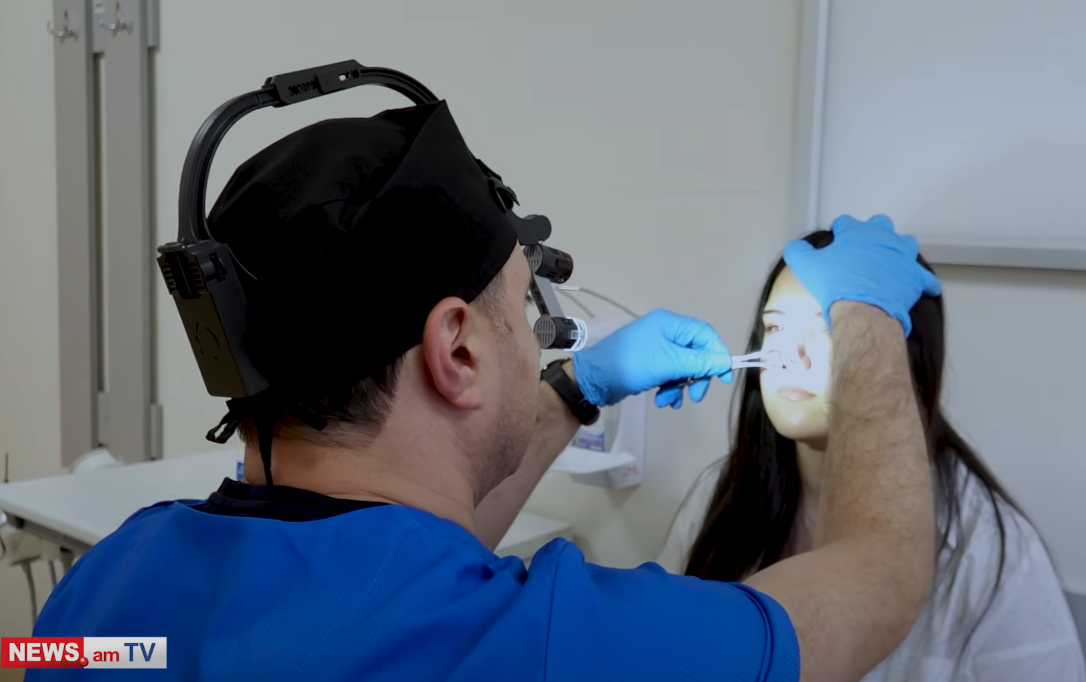
Breathing fully with “Arabkir” MC
03 August 23
Respiratory disorders are quite common among both children and adults, arising from various reasons and requiring different professional approaches.
All the solutions for respiratory disorders are centralized in “Arabkir” medical center, spanning diagnosis, treatment, prevention and control. Through collaborative efforts across our multidisciplinary teams, patients not only receive treatment, but also regain the ability to breathe fully and continue living their lives.
The video of News.am is about respiratory disorders and modern ways for alleviating them.
Encountering challenges while breathing through your nose can result from a variety of reasons. Nasal congestion may stem from infectious diseases or anatomical deviations/neoplasms.
Gurgen Harutyunyan, the head of the pediatric and adult ENT service at the “Arabkir” MC, points out that the most common causes of shortness of breath in children and adults are different:
The most common concern in adults is deviated septum. Two primary factors contribute to this issue. Firstly, the cartilage component of the septum, which divides the nose into left and right segments, develops much quicker than the surrounding skull bones. Consequently, it does not fit in there leading to deformation. Second most common cause are nasal traumas, even those sustained during childhood but not manifesting at that time, but along with the growth and development, the septum is deformed again, hindering normal breathing. Additionally, nasal turbinates become hypertrophic, often resulting from septal curvature or prolonged use of vasoconstrictor nasal drops. This problem can coincide with polyps, which lead to obstruction of the nasal passages.
For children, the prominent cause often revolves around the proliferation of adenoid tissue, located in the nasopharynx. This tissue regresses at the age of 9-10, and the problem disappears. However, in many cases the tissue overgrows, impending normal breathing. Treatment hinges on the level of tissue overgrowth.
If polyps are present in the nose, computed tomography is mandatory to determine the precise location of the polyps and the scope of the operation. At "Arabkir" MC, this procedure is now conducted using endoscopic techniques:
Currently, the operation of polyps in the nasal and adjacent cavities is performed with modern endoscopes in our clinic. This method ensures minimal damage, no incision is made and the surgery is performed through the nostrils under monitoring.
In addition to the endoscope, the ENT service of the center is equipped with a spectrum of modern devices, which are used for nasal turbinate ablation.
Numerous patients are concerned about turbinate hypertrophy, while others have difficulty breathing related to the septum. There are modern approaches in turbinate related disorder treatment: surgical intervention, when vasotomy, lateralization is performed, as well as ambulatory operations on turbinates. In our clinic, we have the Selon device of Olympus company, which is a modern, conservative, sparing and quick method. Through ablation, the size of turbinates is reduced, hence we have a good effect.
Another significant contributor to respiratory complications is allergic rhinitis. And for the treatment of this group, it is necessary to see not only an ENT doctor, but an allergist as well. At the "Arabkir" Medical Center, we adopt a comprehensive approach to tackle this concern. Should your breathing difficulties be suspected to stem from allergies, your otolaryngologist will seamlessly refer you to our allergology service for thorough evaluation. Subsequently, the ENT specialist will administer treatment to alleviate the repercussions of the allergy-induced breathing problems.
According to Gurgen Harutyunyan, it is necessary to pay attention to polyps, as they can have allergic origin and correlate with bronchial asthma.
That is why in such cases we often turn to an allergist for medical advice and the diseases are managed in collaboration. In cases where asthma is identified, thorough preparation under the guidance of an allergist is important prior to polyp removal surgery. Pulmonary function tests are performed, the severity of asthma is assessed, treatment is prescribed, the patient is prepared and ready for the operation.
Allergic rhinitis is also common, leading to difficulty breathing, edema of turbinates and continuous production of mucus coupled with sneezing. Allergic rhinitis can be seasonal and perennial. The treatment here is performed not only by otolaryngologist prescribing drops, but with collaborative effort with allergists to discern the allergen type and recommend medications. When the problem is allergic rhinitis, constant sneezing, difficulty breathing and the patient is examined, we evaluate the color of mucous membrane and turbinates, the severity of swelling, the degree of reduction, the patient’s history (the frequency of patient being sick), then the diagnosis of allergic rhinitis is given followed by collaborative medication prescriptions with allergists. However, surgical intervention emerges as a necessity when a notable septal deviation accompanies allergic rhinitis. Therefore, even in case of reduced turbinates, the deviation will affect the breathing. Surgical correction becomes the preferred route in such instances. The septum deviation is straightened, and turbinates are reduced. A common query that arises is whether symptoms will fade after surgery. The patient’s allergic rhinitis will not be eliminated after the surgery, but when we straighten the septum and the air starts to flow properly, in case of an allergy, when turbinates are enlarged, the breathing will not be that affected and difficult.
As explained by Astghik Baghdasaryan, who leads the Respiratory Medicine and Allergology service, allergy diagnosis unfolds through a two-step procedure:
The initial step involves skin prick tests, which enable the assessment of hypersensitivity or sensitization to a wide array of commonly encountered allergens and facilitate the prescription of conservative treatment for allergic rhinitis. The treatment can be of two types: seasonal therapy and definitive treatment, known as allergen-specific immunotherapy. The latter requires molecular diagnostics, which we conduct as well. That is, when we want to determine which solutions are needed for target therapy, because different people have allergies to different agents or its parts.
To tailor treatment with precision, we employ molecular diagnosis through blood tests, recommending immunotherapy that extends over 3-5 years. Our objective is to sustain treatment for a minimum of 3 years, resulting in a remarkable reduction of allergic rhinitis symptoms by 60-80% throughout the individual's lifetime. Consequently, even if a patient struggles to breathe normally for 3-4 months each season, even with daily medication usage, the risk of lower respiratory tract inflammation and asthma diminishes. This gradual reduction in medication consumption by 60-80% annually significantly curtails the probability of asthma development.
“Arabkir” medical center has a unique respiratory laboratory for allergy and asthma examinations, where static and dynamic lung volumes are measured, various biomarkers are checked, lung and heart functions are checked during physical exertion:
Since allergies are often accompanied by asthma, we have a unique respiratory laboratory in Armenia, which allows us to measure static and dynamic lung volumes. These encompass crucial parameters such as lung capacity, the rate of exhalation, residual air volume post-breath, and the objectivity of these indicators.
We use body plethysmography for children, with whom we work often and they have difficulties with the proper technique of the examination, or for the elderly, who too, have difficulties related to chronic diseases. This examination allows us to measure lung capacities regardless of the patients’ will. Based on this objective data, we are able to confirm or reject the diagnosis.
We also have biomarker tests. That is, if we want to know whether there is a chronic inflammation in the patients’ airways and whether the treatment will be temporary or long-term, we determine the level of nitrogen oxide in expiratory air. It is an allergic inflammatory biomarker in the airways and is predominantly used in developed countries, serving as a crucial diagnostic tool for asthma confirmation.
We also have confirmatory tests for the diagnosis. As we work with draftees as well, for whom it is very important to know whether the person is having difficulties during physical exertion, and if so, what kind of problem it is: is it related to breathing, heart, or metabolism? In this case we have two types of tests. The first one is an exercise induced asthma test, when the patient is running and we are able to determine the changes of the airways. The second one allows us to check the heart, besides the airways. That means we conduct electrocardiography, and at the same time we determine the levels of inhaled and exhaled carbon dioxide, oxygen, and how the heart works. Also we are able to determine if the restriction of physical exertion is associated with improper function of the body or the lack of training. We often use this test to find out the physical preparedness of athletes.
According to Astghik Baghdasaryan the nose is like the “chimney” of the respiratory tract. When it is blocked, a problem can potentially occur in the lower airways because the upper and lower airways are always connected. From the “chimney" to the airways, then to the main organs - the lungs, and the other way: in “Arabkir” MC all areas of healthy breathing are in the center of attention, diagnosing, treating, protecting and preventing in all ways.
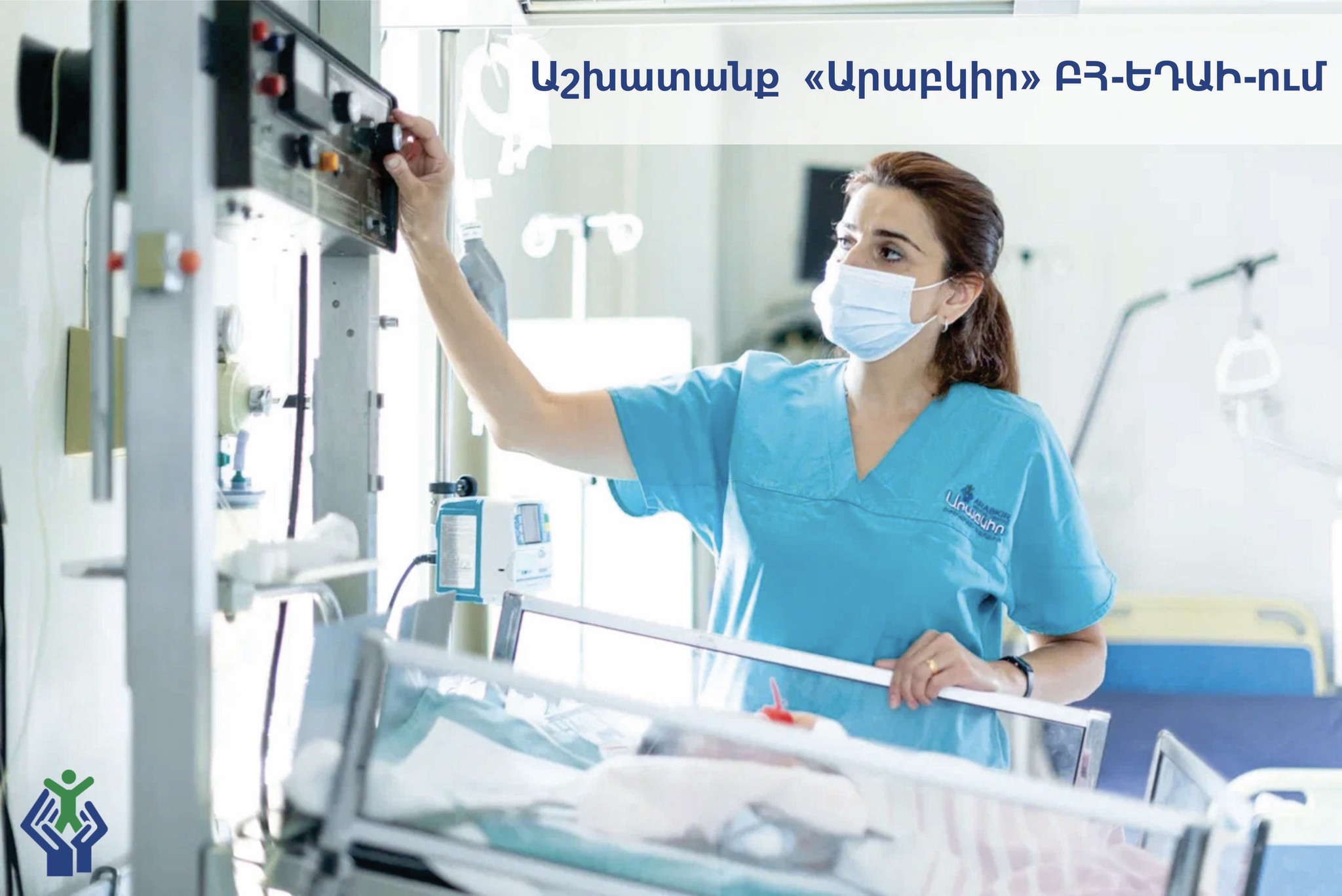
Nurse Vacancy: Apply now!
02 August 23
“Arabkir” Medical Center is hiring nurses on a permanent basis, for shift and day work schedules.
Responsibilities:
perform the appointments of doctors accurately and fully, with quality and on time,
perform the organization of laboratory and instrumental examinations on time, monitor the results,
perform therapeutic care of patients, diagnostic, treatment and prevention interventions according to the doctor’s appointment.
Requirements:
secondary vocational education,
kind, friendly and willing to learn.
Advantages:
opportunities to work with modern equipment, high-quality materials and instruments,
invaluable experience of working in a professional team with doctors, continuous professional development.
Trial period.
Before becoming a full member of our team, the candidate goes through a 3-month trial period, however, the trial period may be shortened, depending on its course.
The trial period helps to get acquainted with the internal regulations of the company and with the performance of work, and gain professional practical and theoretical skills.
To apply, send your CV and motivational letter to [email protected].
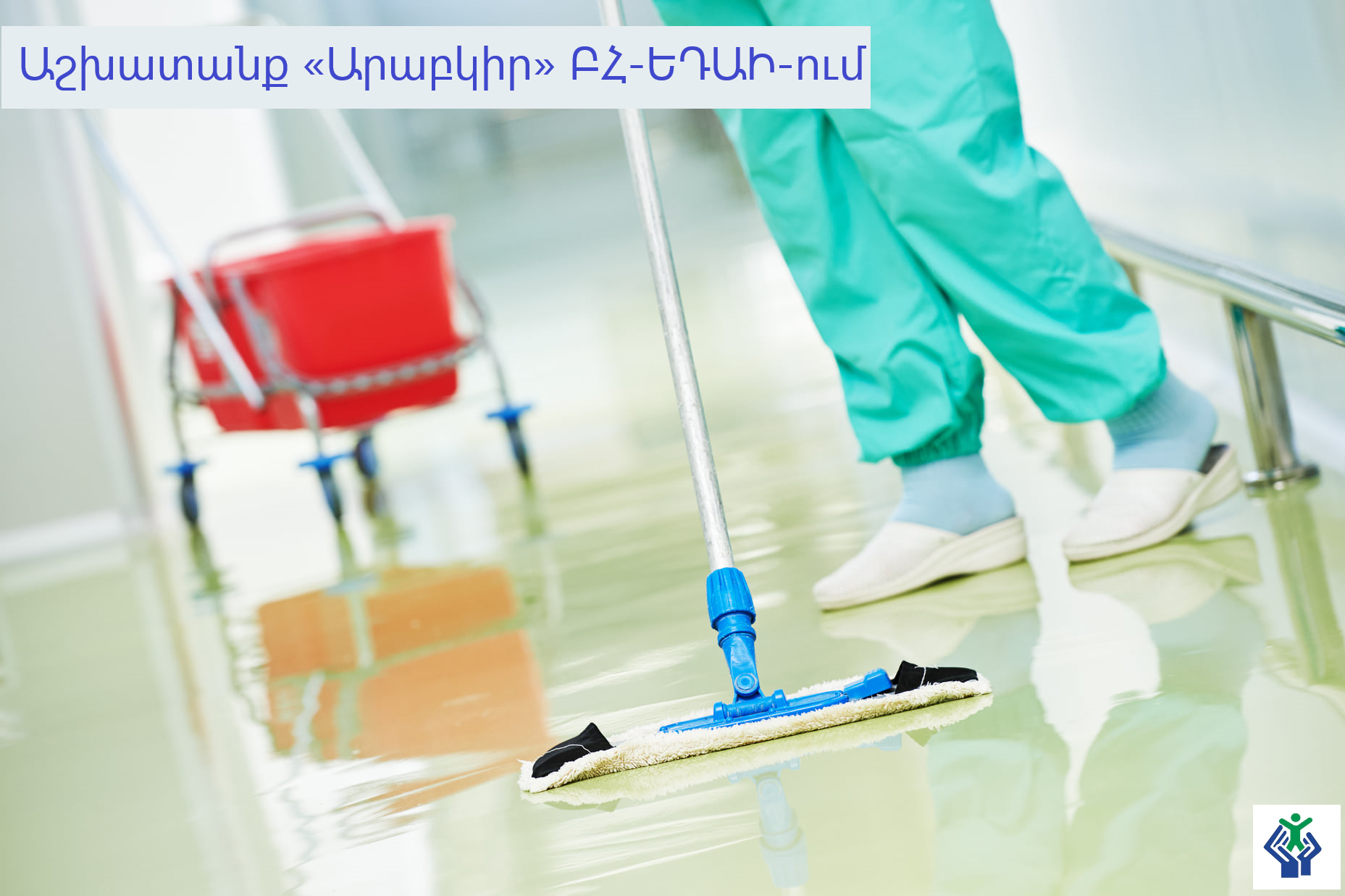
Orderly Vacancy: Apply now!
02 August 23
“Arabkir” Medical Center urgently needs orderlies.
Required skills:
agility
fastidiousness
responsibility
Duties and responsibilities:
Perform the cleaning of the assigned area.
Maintain sanitary and hygienic rules.
Schedule: 5 days a week, day-time.
To apply, please visit “Arabkir” MC at the following address:Mamikonyants 30 str.
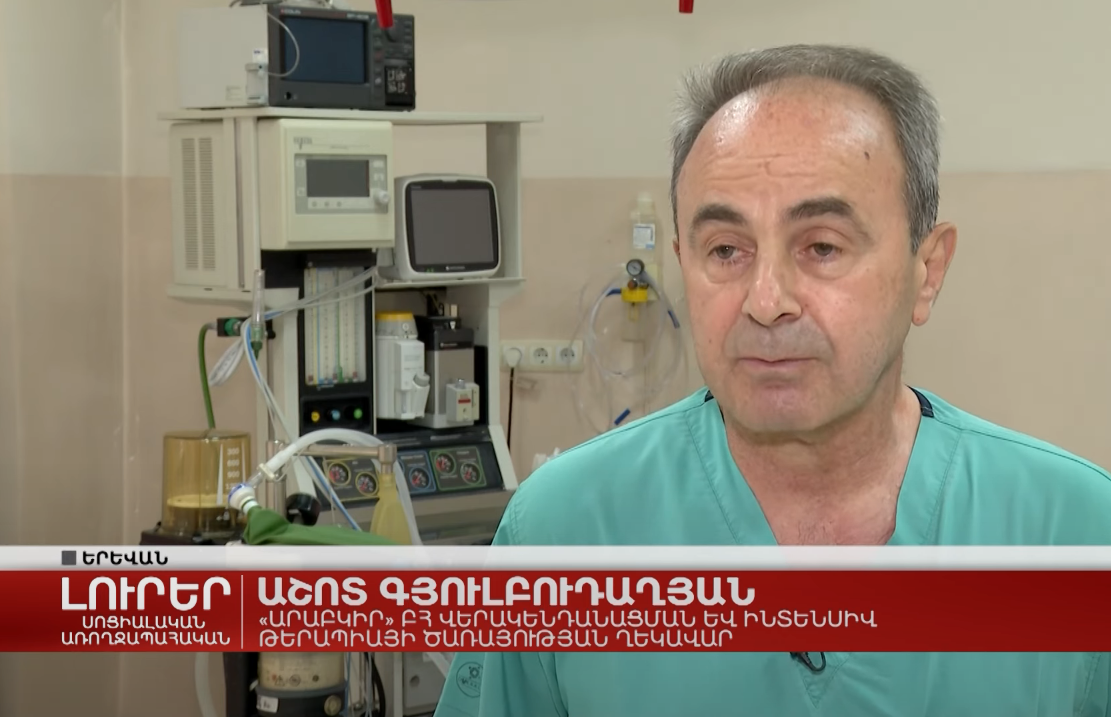
The Life of a Child was Saved
25 July 23
Our dedicated team of specialists in the Resuscitation and Intensive Care Service successfully saved the life of another child, 2.5-year-old Arpi, who accidentally consumed pesticide from a juice bottle in their garden.
Dear parents, be cautious, keep medicines, pesticides and other harmful substances far away from areas accessible to children. The inadvertent, unconscious indigestion of such substances can lead to the most undesirable consequences.
Thank you, dear doctors.
Thank you, Public TV Company.
At the intensive care unit of "Arabkir" medical center, 2.5-year-old Arpi is peacefully sleeping. Just a few days ago, this child accidentally consumed a highly dangerous and potent agricultural pesticide from a juice bottle at home.
Ashot Gyulbudaghyan /head of the Intensive Care and Resuscitation Service of “Arabkir” Medical Center/ — It is a pesticide to clean trees, which is an organophosphorus compound and is highly toxic. To illustrate its potency, just one gram of this compound is enough to dissolve in 20 liters of water for use.
Doctor Gyulbudaghyan hurries to check the health condition of the child before the girl wakes up and gets into mischief. The little one is being prepared for discharge, or rather, to continue the further course of treatment at the Pediatric Toxicology center. The patient was brought from Charentsavan in an extremely critical condition that the doctors immediately put her on artificial respiration. The case gained attention through a social media post: the life of the little one depends on us, we need to find the medicine that was not readily available. People even offered assistance from Moscow. However, fortunately, the necessary product was found on-site.
Ashot Gyulbudaghyan /head of the Intensive Care and Resuscitation Service of “Arabkir” Medical Center/ — Organophosphorus compound has two antidotes: we had one and administered it immediately. However, the second was not available at our hospital. We contacted the Pediatric Toxicology department, resuscitation in Muratsan, but they did not have it either. Then they contacted the adult toxicology department in Cheryomushka, where the second antidote was available. The parents brought it, and we administered both antidotes.
The worst is now behind us. The complications that arose from the pesticide exposure and affected the cardiovascular and respiratory systems have been overcome. Arpi has been breathing on her own since Thursday. Thanks to the intensive treatment, they managed to avoid damage to her liver and kidney. However, there are still certain neurological consequences such as convulsions, hand tremors.
Ashot Gyulbudaghyan /head of the Intensive Care and Resuscitation Service of “Arabkir” Medical Center/ — As of today, the child’s health has significantly improved, showing positive dynamics. Her consciousness is clear, she is eating normally. Her reactions to the environment are within the expected range. She has certain neurological disorders that result from poisoning, but they are transient.
The important thing is that the body rids itself of the poison. The indicators of our small patients, from fever to food, are recorded in the logbook by the nurses who monitor their health around the clock.
A fragment from nurses’ conversation — The condition is stable. As I can see, she is sleeping. Yes. She will be fed at 11:30, 150 ml.
It is unknown how much pesticide Arpi consumed. The specialist says that one sip, even 5 milligrams, is considered a lethal dose for her weight. In this case, doctors were able to save her, because the child was not hungry, preventing rapid absorption of the substance into her bloodstream. Moreover, the mother promptly induced vomiting, leading to the expulsion of some of the poison.
“I am grateful to everyone” said the father, who requested not to be filmed, and wanted to convey his appreciation. Pediatricians strongly urge him and all parents to be vigilant in keeping medicines and various household chemicals out of reach of children. Among 2-5 year olds, accidental poisoning is particularly dangerous, as they often put into their mouths what gets into their hands without understanding.
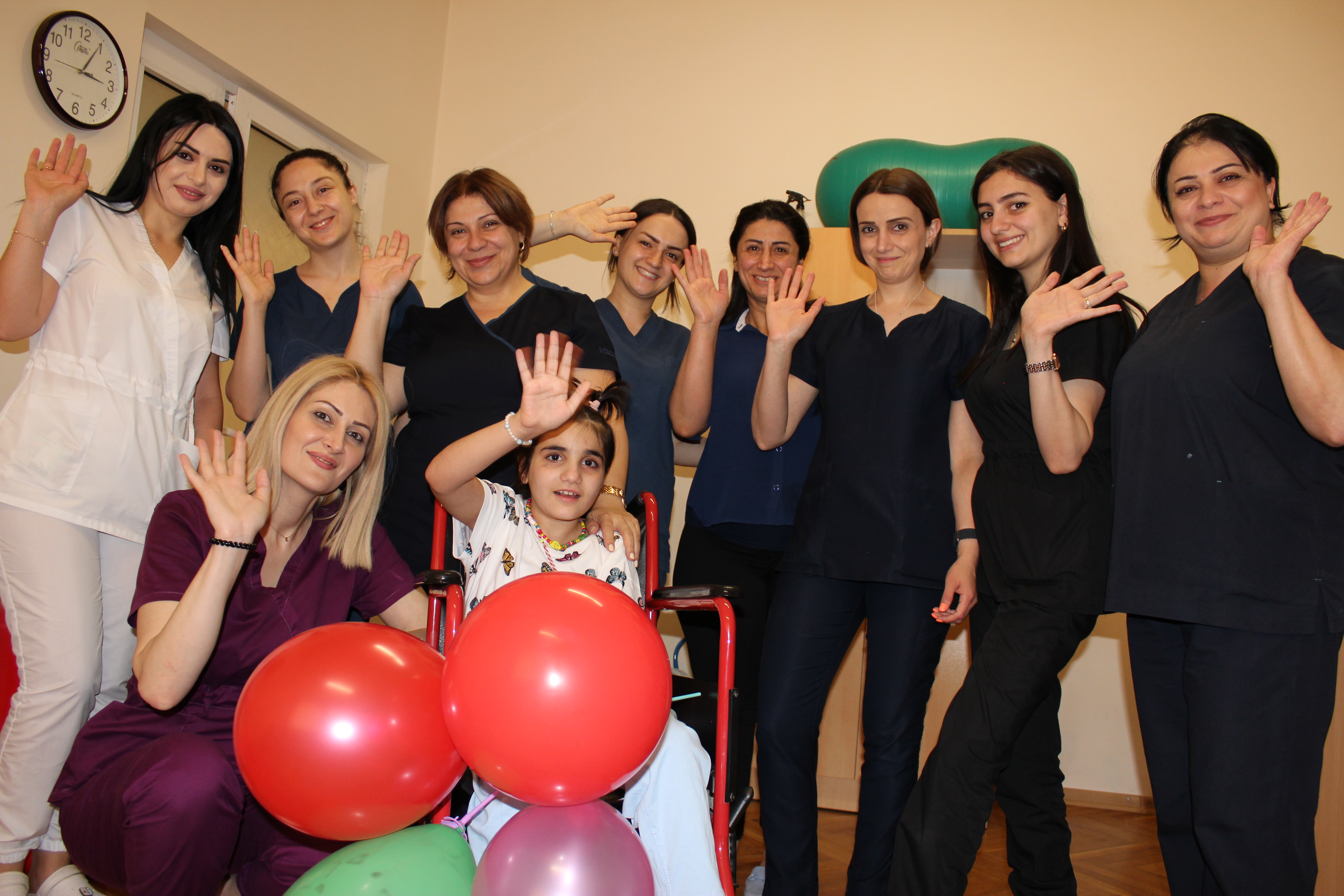
Rehabilitation Service: Arin and Mher
21 July 23
The stories of 15-year-old Mher and 10-year-old Arin are emotional and seem almost miraculous. Mher was involved in a car accident in Yerevan, while Arin experienced a car accident in Iraq. Both children were in critical condition and taken to intensive care units of medical institutions - one in Yerevan, the other in Iraq. Then operations were performed, and they were transferred to the rehabilitation service of the "Arabkir" medical center.
Now that the children have been discharged, their relatives admit that this road was undeniably challenging, but they were able to get through it with the help of dedicated professionals, cooperations between different medical institutions, coordination with the Ministry of Health and strong teamwork within the hospital.
Thank you, dear doctors and the team of rehabilitation service: physiotherapists, occupational therapists, speech therapists. Mher and Arin are really strong thanks to you.
Thank you, news.am.
In the clinical rehabilitation department of the "Arabkir" medical center, specialists are working to help 15-year-old Mher Avdalyan to get back on his feet. A specialized team of physiotherapists and occupational therapists works with him.
On February 20, Mher was hit by a car. He was taken to the hospital in critical condition. The boy suffered a cranial injury, multiple fractures, including his neck. He slipped into a coma for nine days, then regained consciousness, but had developed complicated pneumonia, and experienced difficulties with movement and communication.
Liana Aghajanyan /Pediatric Rehabilitation Specialist, manual therapist, head of the Clinical Rehabilitology Department at the“Arabkir” MC/ — Mher Avdalyan was brought to the hospital on a stretcher, with a tracheostomy. He had to be fed through a nasogastric tube since he was unable to consume his daily ration. There were difficulties with drinking, he was unable to sit, also his leg was broken and was in a cast. Rehabilitation was aimed at eliminating secondary complications, as in many cases patients can die because of it: wounds, vascular plaques, etc. As the patient had been in a horizontal position for an extended period, the process of sitting was particularly challenging. However, he managed to sit, achieve an independent sitting position, use his hands, get up independently, and stand.
Mher's mother holds strong faith and unwavering belief that they will overcome this stage as well, and the child will be able to walk. Along with specialists, Mher's family also helps him in his recovery.
Gohar Avdalyan /Mher’s mother/ — “Arabkir” medical center helped my child a lot to get back on his feet. I am very grateful to them for the care provided by the doctors and everything they have done. Well, I have never been here, I am a mother of six children, but none of them has been in a hospital before. They did a great job, thanks to which my child can now sit. Previously, he couldn't sit and was always lying down, but now he can sit and talk. He was not able to communicate at that time, but now he communicates and expresses his needs.
After completing the rehabilitation treatment in the acute phase, when boy’s condition had stabilized, and the boy was able to sit, drink and eat by himself, and his respiratory function had fully recovered and the tracheostomy was removed, Mher went to the next stage of rehabilitation treatment at the ArBeS Health Center of the “Arabkir” medical center. Although he still relies on a wheelchair, Dr. Liana Aghajanyan considers it a big achievement. They are hopeful that with ArBeS' training, Mher will regain the functions of standing and moving.
Dr. Liana Aghajanyan shares details about another complicated case. 10-year-old Arin Petrosyan was brought to "Arabkir" medical center following a serious car accident that took place in Iraq. After spending two months in the intensive care unit there, Arin had to be transferred to Armenia due to the unavailability of rehabilitation services. The Ministry of Health directed her to the “Arabkir” medical center, which houses a specialized clinical rehabilitation department.
Liana Aghajanyan — Why clinical rehabilitation? Because there are various medical conditions, where relying solely on inpatient care may not be safe, especially when there is no multidisciplinary team available to provide timely services.
After experiencing any trauma, particularly brain or spinal cord injuries, burns, amputations or severe orthopedic damage, children require reintegration into their normal lives. To achieve this, a series of measures must be taken to help the child to return to their everyday life.
Arin was brought to the medical center on a stretcher. She had multiple fractures, had a shunt, and was receiving anti-seizure treatment. Due to neurological damage, she was unable to hold her head, sit, or turn over in bed, and her speech was also absent. The fact that the child did not understand Armenian, made the doctors' work difficult.
Arin came from a large family of eight, but only she and her younger brother survived. In Armenia, her relatives took care of her.
Liana Aghajanyan — After rehabilitation, the child was able to sit independently, maintain a stable sitting position, although these actions were impossible in the first month. She started using her hands, but the neurological deficit was still present, and the actions were performed with errors. She began to understand and speak Armenian, even though the main language was Arabic. The center's speech therapist learned Arabic, while Arin learned Armenian, and their communication was significantly improved. The recovery progressed to the stage where the child was able to hold and stand. However, walking was still not developed due to some remaining leg contracture.
Rehabilitation therapy is a collaborative effort, coordinated by a rehabilitation physician, with each specialist contributing their expertise. The physiotherapist focuses on improving large movements such as sitting, standing, moving, walking and developing balance and coordination. With the help of the occupational therapist, self-care skills are restored, including eating, dressing, combing, washing, as well as performing delicate actions with small objects by enhancing the development of sensory receptors. The speech therapist’s work is aimed at enhancing speech perception and pronunciation, as well as correcting any disorders related to swallowing to ensure safe eating and drinking.
Liana Aghajanyan — Our entire therapy approach was based on the concept of play. It is essential in our work, as it creates motivation. Over the course of approximately 4 months of rehabilitation treatment, Arin's health condition has significantly improved.
Thus, slowly moving forward, the team bid a fond farewell to Arin, who had become everyone's favorite. She was now making jokes and even imitating Mher, who was practicing in the next room.
Arin imitating Mher — Lilia, Mher talks like this - ya, ya, ya…
Vigen, a family friend, uncle, as Arin called him, came with his children and conveyed the words of gratitude from Arin’s grandmother.
The “Arabkir” medical center’s Rehabilitation department serves many children, like Arin and Mher, and adults, including soldiers wounded during the war. With the support of a professional team, they regain their lost skills and reintegrate into the next stages of life.
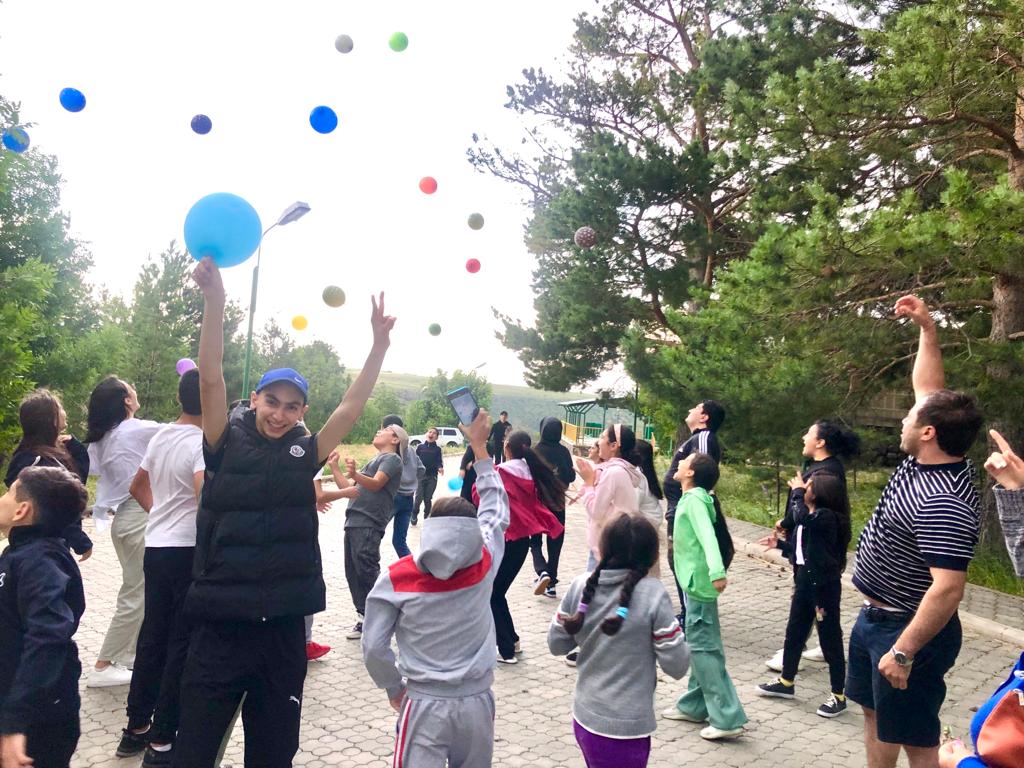
Summer Camp for Pediatric Dispensary Patients
18 July 23
The Aparan health resort of the "Arabkir" Medical Center has reopened its doors again and is now welcoming its second shift. Endless games, song and dance performances, painting and fine arts, competitions, sports, swimming pool. The children from various services of the "Arabkir" MC dispensary enjoy the most genuine luxury of human contact.
The days spent here with friends, teachers and specialists of the rehabilitation team are truly unforgettable. All the children who came to the camp express a strong desire to return, says Armine Episkoposyan, who is responsible for the camp. According to her, the camp seems to possess a special force of attraction here, and the force is the power of friendship.
The camp will remain open until August 23rd, accepting two more shifts. Each shift accommodates 30-40 children for 14 days.
May you have a wonderful rest and we wish you all good health, dear campers!
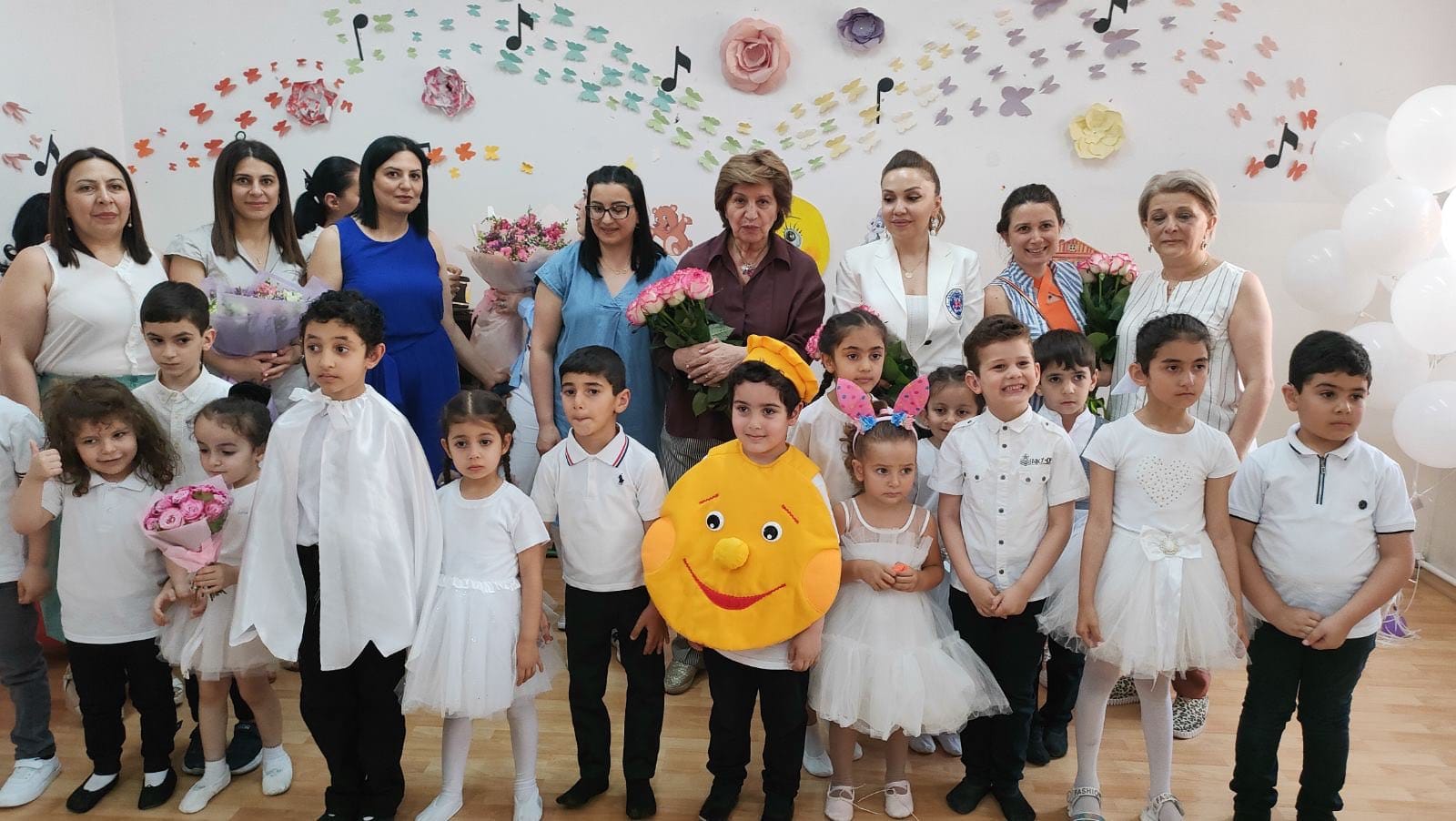
From Speech Development Center to School
17 July 23
This year's session of the Speech Development Center for children with hearing impairment concluded with a joyous ceremony. 8 children transitioned to public schools, with developed speech, which hold immeasurable importance for their further education and life in general.
Considering that there are very few of the society, it can be said that special representatives, who know the sign language with which deaf and hard of hearing people communicate, the speech development of these children becomes a top priority, which is what the professional team of the "Arabkir" Medical Center is aiming for.
First of all, the correct hearing aids are selected and adjusted for children according to the degree of hearing and individual needs. In parallel with that, consultation meetings with audio therapists are organized. A little later, scheduled classes are conducted - two days of individual sessions and two days of group-musical sessions.
Thus, our children start learning from the earliest age, attending classes, feeling responsibility and becoming more organized and independent. This is noticed by their school admissions teachers.
We wish you all the best, an interesting and pleasant trip to school, our dears!
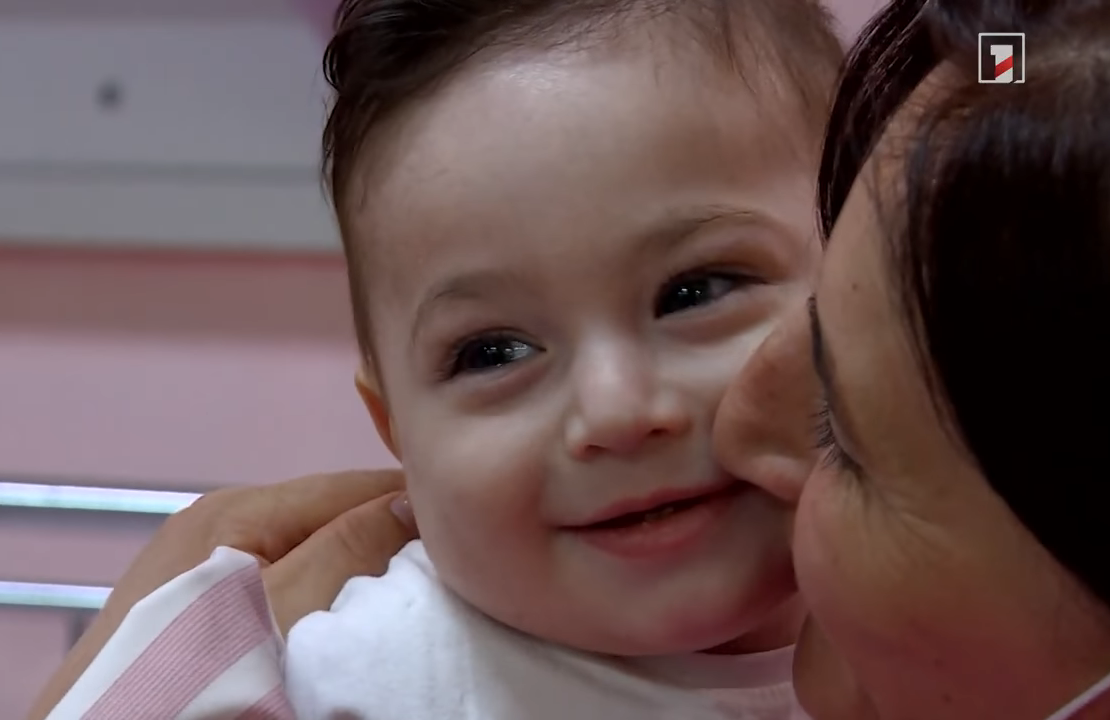
Public TV Company reference to little Monte
12 July 23
This time, the Public TV Company visited our little child from Artsakh. They noticed that Monte is missing his mom.
We hold onto the hope that the child will recover from this illness without any consequences and will return home with his parents, to his sisters and brothers.
The team of “Arabkir” MC is putting maximum efforts to ensure the well-being of the child.
On June 24, a baby, who was transported by helicopter from Nagorno Karabakh to Armenia in a critical condition, is currently receiving care in the intensive care unit. The baby’s life was saved, and the doctors are now dedicated to helping the child make a complete recovery. Initially, he was diagnosed with tonsillitis, but the virus has affected the baby’s brain. The condition of the baby worsened due to the unavailability of medication caused by the blockade of the Lachin corridor.
Monte started crying when he saw his mother. Then he found comfort in his mother’s arms and eventually started to smile.
Narine Melkumyan (the mother of the child) - I could not have imagined how it would be, that we would have to move to Armenia and that our child would be saved.
Meetings are not held on a daily basis, as the child remains in quarantine within the intensive care unit.
Monte is the baby who was airlifted from Nagorno Karabakh to Armenia on June 24th, in an extremely critical condition, accompanied by Russian peacekeepers. The child was diagnosed with tonsillitis, an inflammation of the tonsils, and later it was discovered that the virus had spread to the nervous system, impacting the brain.
Ashot Gyulbudaghyan (the head of the Intensive Care and Resuscitation Service of “Arabkir” Medical Center) - Time was of the essence.
Currently, the one-year-old boy is able to drink on his own, move around, and explore us, strangers. Prior to his transfer, the baby was in the “Arevik” Children's Hospital in Stepanakert. During the last two days of his stay, he was in a serious condition. However, due to the road blockade imposed by Azerbaijani side, which included an unauthorized checkpoint on the Hakari bridge and restrictions on Red Cross movement since June 15th, it was challenging to transfer him to Armenia.
And only on the morning of June 24th, it was possible to transport the baby by helicopter to Sisian, and from there to Yerevan,using a specially equipped resuscitation vehicle.
Ashot Gyulbudaghyan - All necessary measures were taken, but the main issue lied in the availability of medication, as there were only two vials of the required treatment. The child remained unconscious, showing no response or reactions, except for movements and reactions to intense pain. The medication administered upon arrival in Yerevan needs to be continued for a duration of 21 days.
The medical team is now relieved regarding the child's life, and now they are fighting for his complete recovery, as any delays in treatment may result in disability.
Ashot Gyulbudaghyan - The dynamics witnessed over the course of these 16 days provide strong indications that the child is likely to achieve a full and complete recovery.
The medical team anticipates that within 5 days they will be able to remove the label "Monte" from the bed and transfer the baby to a regular ward. Doctor Gyulbudaghyan is confident that the presence of the child's mother will contribute to a faster recovery, given that the issue is related to the nervous system. Monte's mood visibly changed when his mother left, and even his favorite cartoon failed to bring a smile to his face. The neurologist is making efforts to provide comfort and reassurance.
Ani Sharyan (pediatric neurologist) - He looks, follows, and the movements of his hands and legs have fully recovered.
While we were in the intensive care unit, Monte's father waited by the doors of the medical center for the next update.
Karen Grigoryan (the father of the child) - Ehh, you child in front of your eyes…I don’t know…
He has not seen his child for 16 days. He is looking at the pictures from Monte’s first birthday party on May 25th, waiting for the moment they can return home to Martakert, where their other two children are waiting for them. In the meantime, when not pacing the hospital corridors, they stay in the accommodation provided by the medical center. The duration of Monte's complete recovery remains uncertain even to the doctors. Even after being transferred to the hospital, it will still take weeks for him to fully recover.
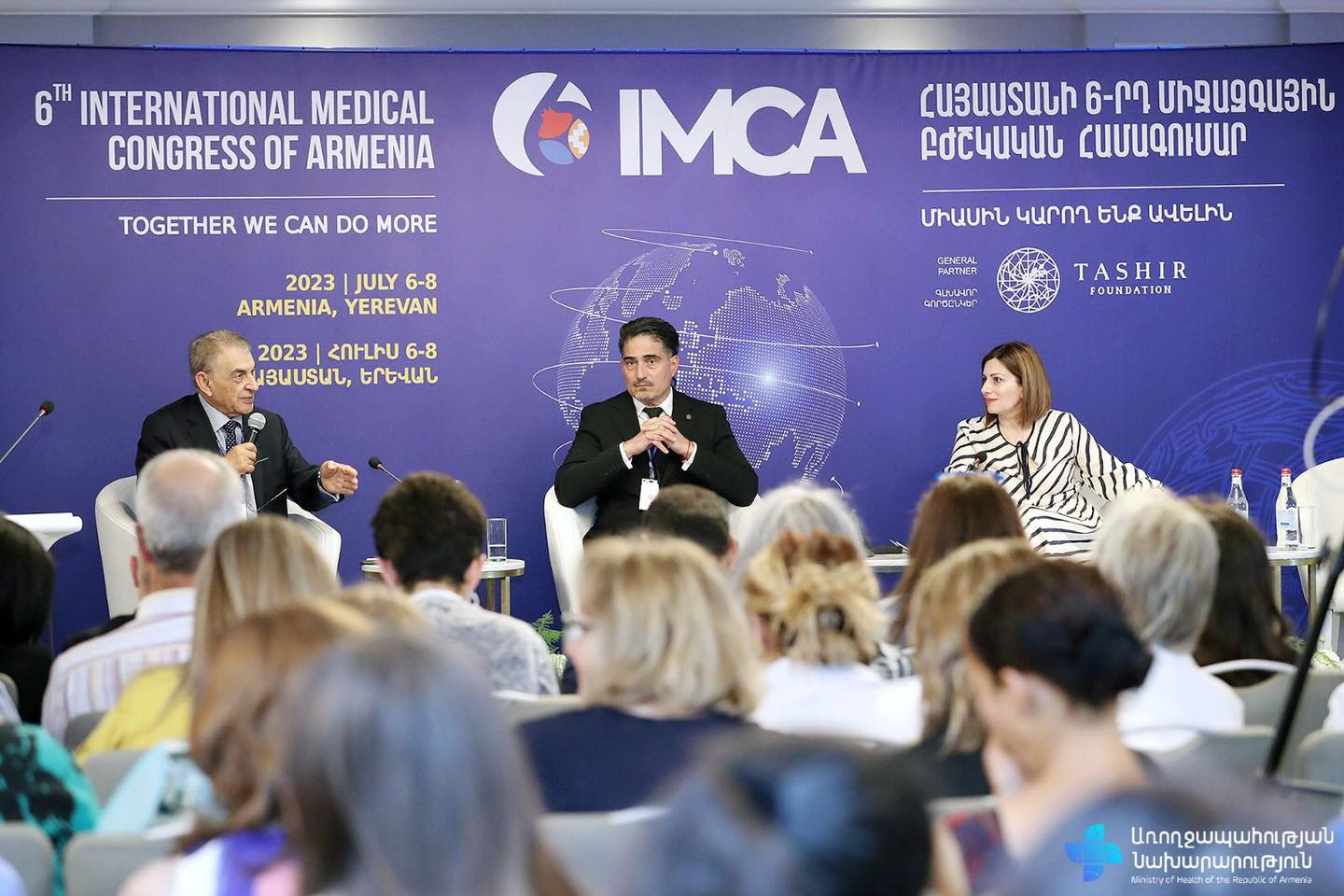
IMCA 6 Summary
11 July 23
Summarizing the participation of “Arabkir” MC-ICAH at the 6th International Medical Congress of Armenia (IMCA 6):
two satellite symposiums on topics of “Pediatric Dermatology” and “Cystic Fibrosis”,
about 30 oral presentations during plenary sessions and satellite symposiums of the congress, covering topics such as healthcare management, nursing, therapeutic and surgical specialities,
about 30 published abstracts in the “Armenian Journal of Health and Medical Sciences”, published by the National Institute of Health,
9 specialists from “Arabkir” MC were included in the 119-member scientific council of the congress,
Professor Ara Babloyan, the scientific head of the “Arabkir” MC-ICAH, served as the Honorary President of the congress.
It is worth noting that this year’s congress witnessed an unprecedented participation of 518 specialists, with 345 of them from Armenia.
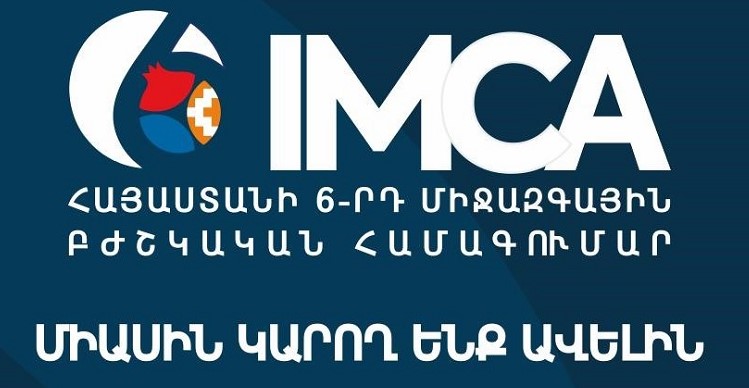
IMCA 6 has started
06 July 23
Today marks the beginning of the International Medical Congress of Armenia, titled “Together we can do more”. The official opening ceremony of the congress took place yesterday at the American University of Armenia.
During the ceremony, Archbishop Nathan Hovhannisyan, head of the Department of Foreign Affairs and Protocol of Mother See Holy of Echmiadzin, conveyed the blessing and greetings of His Holiness the Patriarch to the participants of the congress. Anahit Avanesyan, the Minister of Health of the RA, Vardan Tadevosyan the Minister of Health of the Republic of Artsakh, Ara Babloyan, the honorary president of the congress, Vigen Sepilyan, the president of the International Armenian Medical Committee, Gevorg Yaghjyan and Hambardzum Simonyan co-chairs of the IMCA 6, also delivered welcome speeches.
During the opening ceremony of the congress, a group of distinguished individuals in the field of medicine, including Ara Babloyan, the scientific head and president of the Board of Directors of “Arabkir” MC-ICAH, and Biayna Sukudyan, the head of the Neurology and Epileptology service of the medical center, received special awards.
We extend our congratulations to everyone and wish for a healthy and peaceful congress.
The congress will continue until July 8th, you can stay updated through the IMCA6 website and Facebook page.
https://6imca.am/
https://www.facebook.com/6imca
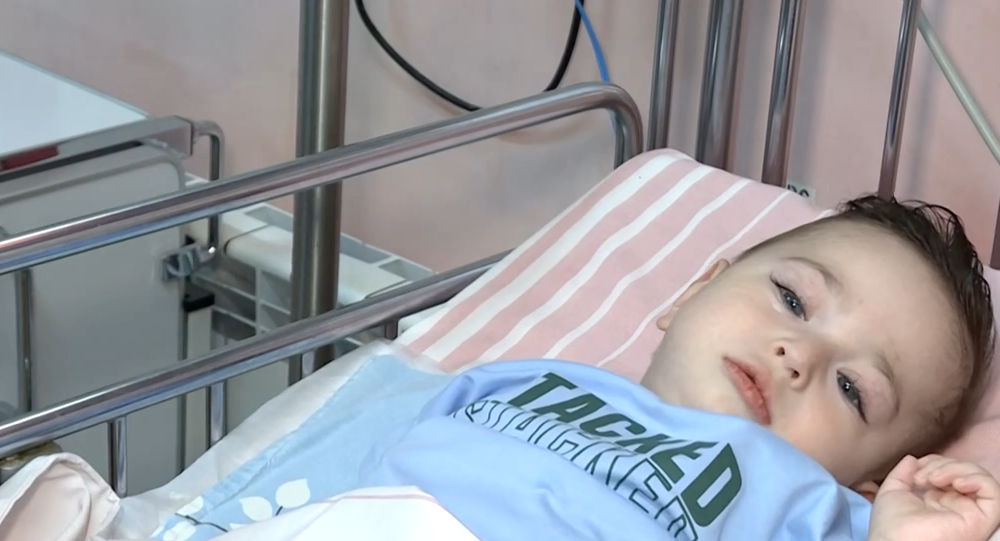
The Little Child from Artsakh Making Positive Progress
04 July 23
One-year-old Monte, who was transported from Artsakh to Armenia by helicopter, is showing positive progress and we remain hopeful for his full recovery without any lasting effects.
The team at "Arabkir" Medical Center is dedicated to providing the best possible care for all our patients in need, including little Monte.
We would like to highlight that last week, Biayna Sukhudyan, the head of the Neurology and Epileptology service of "Arabkir" MC, returned to Artsakh with the assistance of the Red Cross. She has been in Artsakh for two months since the day before the blockade. There are no pediatric neurologists in Artsakh, while the demand for their services is high.
Thank you, dear doctors!
Thank you, Azatutyun Radio Station!
Monte is still being cared for in the intensive care unit, but what is important is that he has regained consciousness, opened his eyes, is able to move his arms and legs, and sometimes watches cartoons.
On June 24th, a one-year-old baby from Artsakh was transported by helicopter in an extremely critical state, with the assistance of Russian peacekeepers. During that time, the Hakari checkpoint was closed by the Azerbaijani side even for seriously ill patients. The helicopter carrying Monte landed in Sisian, where the specially equipped resuscitation vehicle from the "Arabkir" Medical Center was awaiting for his arrival.
"Upon admission, Monte’s condition was severe, presenting with brain inflammation and impaired consciousness and motor functions," explained Ashot Gyulbudaghyan, the head of the intensive care and resuscitation department of the "Arabkir" Medical Center.
According to Gyulbudaghyan, during the child's initial treatment at the "Arevik" Children's Hospital in Stepanakert, attempts were made to manage his condition through remote consultations. However, it eventually became clear that this approach was not feasible. The child was initially admitted with tonsillitis, but the virus later entered the nervous system, affecting the brain.
"This child specifically required antiviral medicine, of which there was only one or two available," stated the head of the resuscitation department of the "Arabkir" Medical Center.
"We needed certain specific tests that are only conducted in Armenia," said Ani Sharyan, a pediatric neurologist at the "Arabkir" Medical Center.
The resuscitation, neurology, and rehabilitation specialists have already initiated their work. The doctors of "Arabkir" emphasize that the baby's life is no longer in danger and they hope that a complete recovery will not be delayed.
Various specialists approach the small bed named "Monte" one by one, conducting rehabilitation and neurological exercises.
In Artsakh, the shortage of neurologists is a particularly pressing issue, as emphasized by pediatric neurologist Ani Sharyan. Since 2011, the specialists of the medical center have been regularly visiting Artsakh for consultations. However, the closure of the roads has further complicated the situation. A few days ago, Biayna Sukhudyan, the head of the neurological department, arrived in Stepanakert again with the assistance of the Red Cross.
Only parents can truly know what it means to wait hopelessly with a child who has a serious health condition.
Monte's father, Karen Grigoryan stated, "In the afternoon, we were informed that the child would be transported to Armenia. We got ready, then we were informed that there are problems on the Azerbaijani side, with the air route not being opened. Negotiations were conducted throughout the night, and at 10 o'clock in the morning, the air route was finally opened. We were then transported to Yerevan by helicopter."
Monte's parents endured a day of waiting in Stepanakert, as their child was already experiencing seizures, hoping for permission from the Azerbaijani side to allow the child to be airlifted to Yerevan. Karen Grigoryan, the father, has yet to see the child in the intensive care unit. He only imagines his face with a smile, reminiscent of happier times before the unfortunate tonsillitis.
The medical staff updates the parents twice a day on the child's health condition and occasionally permits the mother to visit her son.
"As soon as I utter a word, the child starts crying, and I leave,” said Narine Melkumyan, the mother.
Karen and Narine are waiting for their son's recovery in the accommodation provided by the hospital. They hope that a land or air journey will take the three of them to Martakert in a good mood.

 English
English
 Հայերեն
Հայերեն Русский
Русский